On Nov. 16, 2009, space shuttle Atlantis began its 31st trip into space, on the third Utilization and Logistics Flight (ULF3) mission to the International Space Station, the 31st shuttle flight to the orbiting lab. During the 11-day mission, the six-member STS-129 crew worked with the six-person Expedition 21 crew during seven days of docked operations. The mission’s primary objectives included delivering two external logistics carriers and their spare parts, adding nearly 15 tons of hardware to the station, and returning a long-duration crew member, the last to return on a shuttle. Three of the STS-129 astronauts conducted three spacewalks to transfer spare parts and continue assembly and maintenance of the station. As a group of 12, the joint crews celebrated the largest and most diverse Thanksgiving gathering in space.

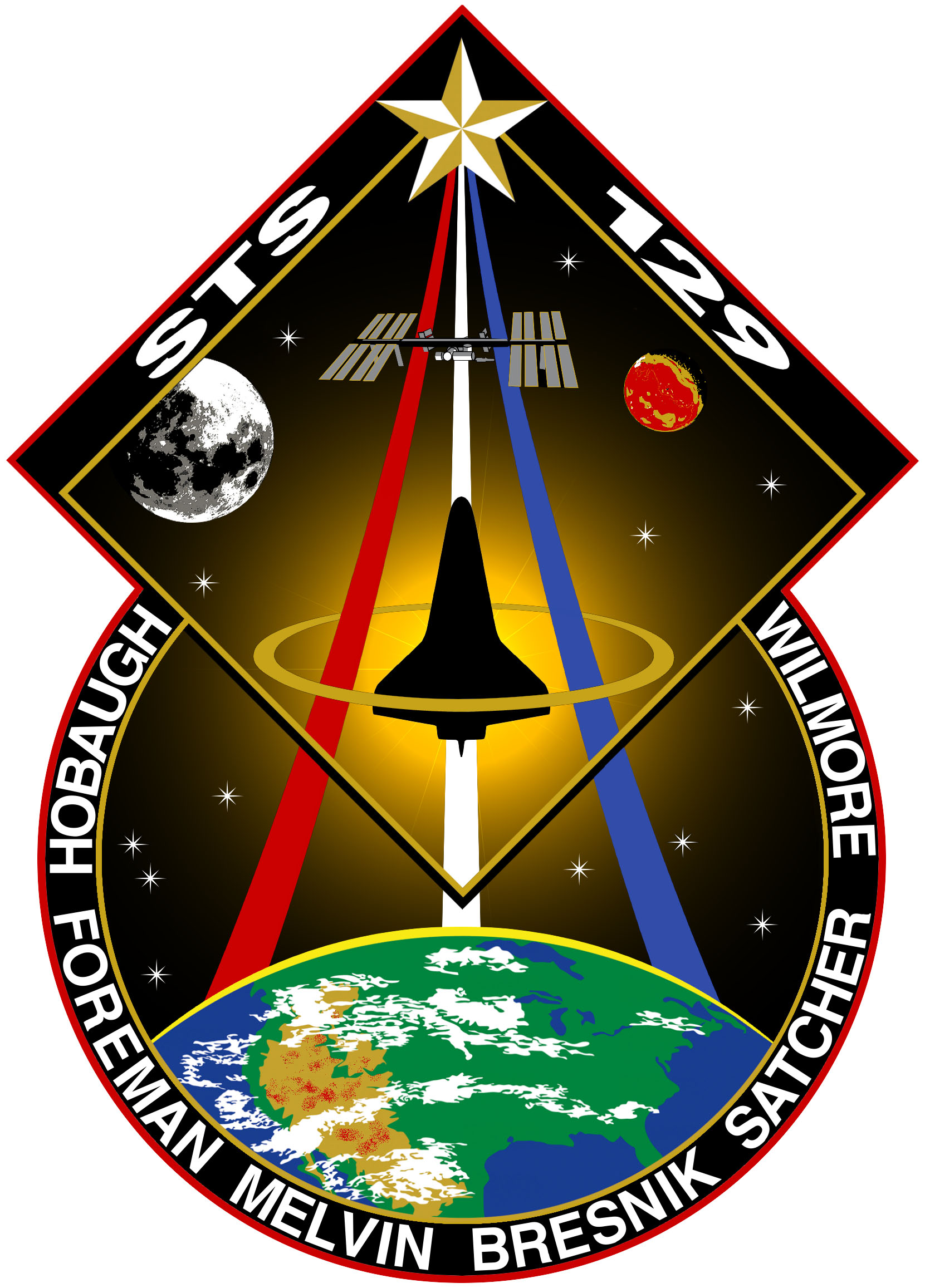
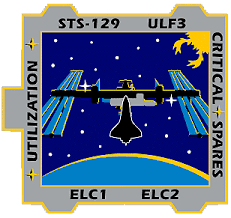
Left: Official photograph of the STS-129 crew of Leland D. Melvin, left, Charles O. Hobaugh, Michael J. Foreman, Robert “Bobby” L. Satcher, Barry “Butch” E. Wilmore, and Randolph “Randy” J. Bresnik. Middle: The STS-129 crew patch. Right: The ULF3 payload patch.
The six-person STS-129 crew consisted of Commander Charles O. Hobaugh, Pilot Barry “Butch” E. Wilmore, and Mission Specialists Randolph “Randy” J. Bresnik, Michael J. Foreman, Leland D. Melvin, and Robert “Bobby” L. Satcher. Primary objectives of the mission included launch and transfer to the station of the first two EXPRESS Logistics Carriers (ELC-1 and ELC-2) and their multiple spare parts, and the return of NASA astronaut and Expedition 20 and 21 Flight Engineer Nicole P. Stott, the last astronaut to rotate on the shuttle.
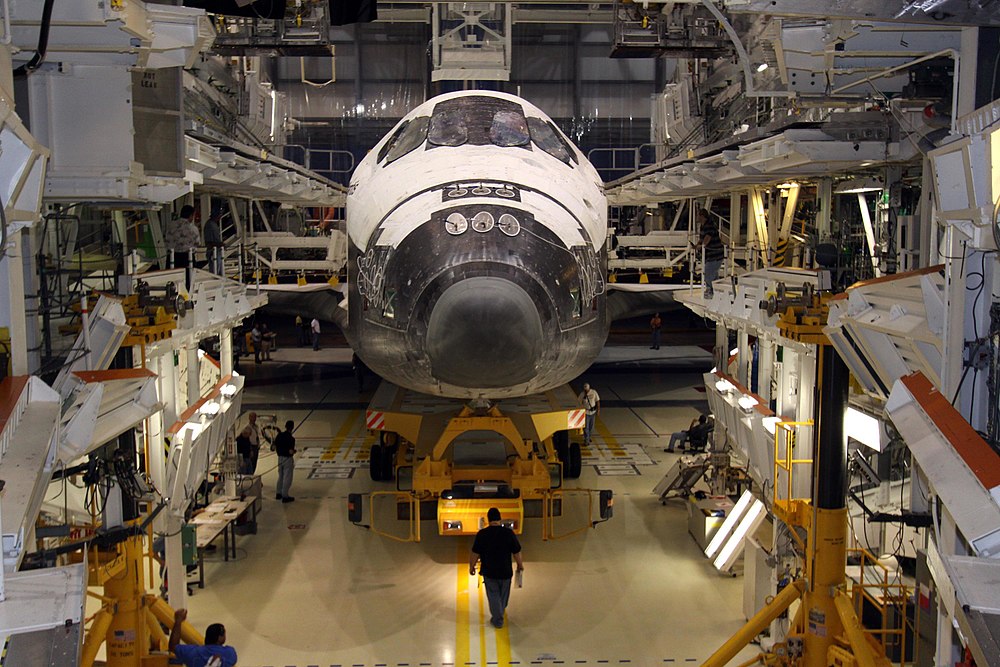
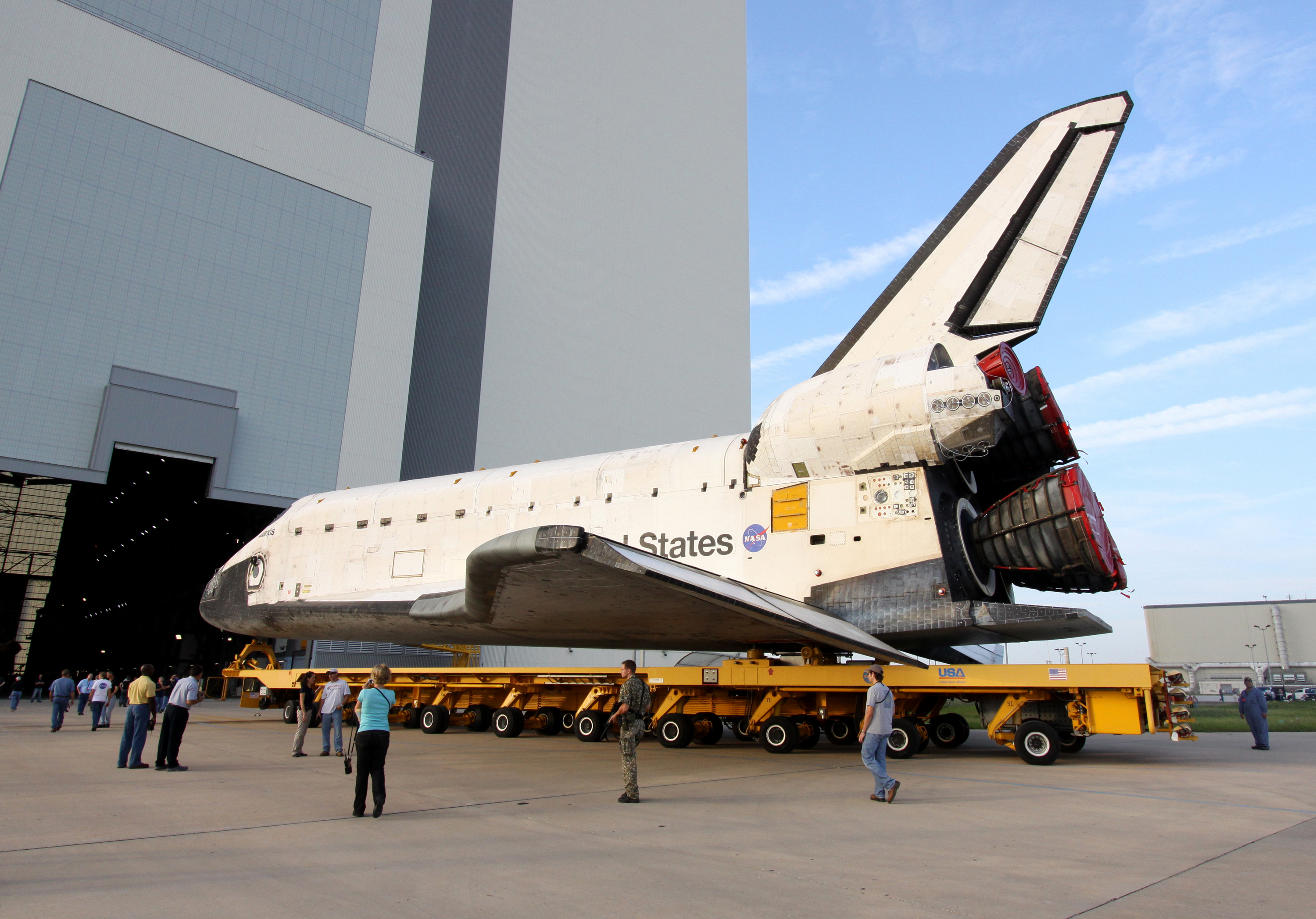
Left: In the Orbiter Processing Facility (OPF) at NASA’s Kennedy Space Center in Florida, workers finish processing Atlantis for STS-129. Right: Space shuttle Atlantis rolls over from the OPF to the Vehicle Assembly Building.

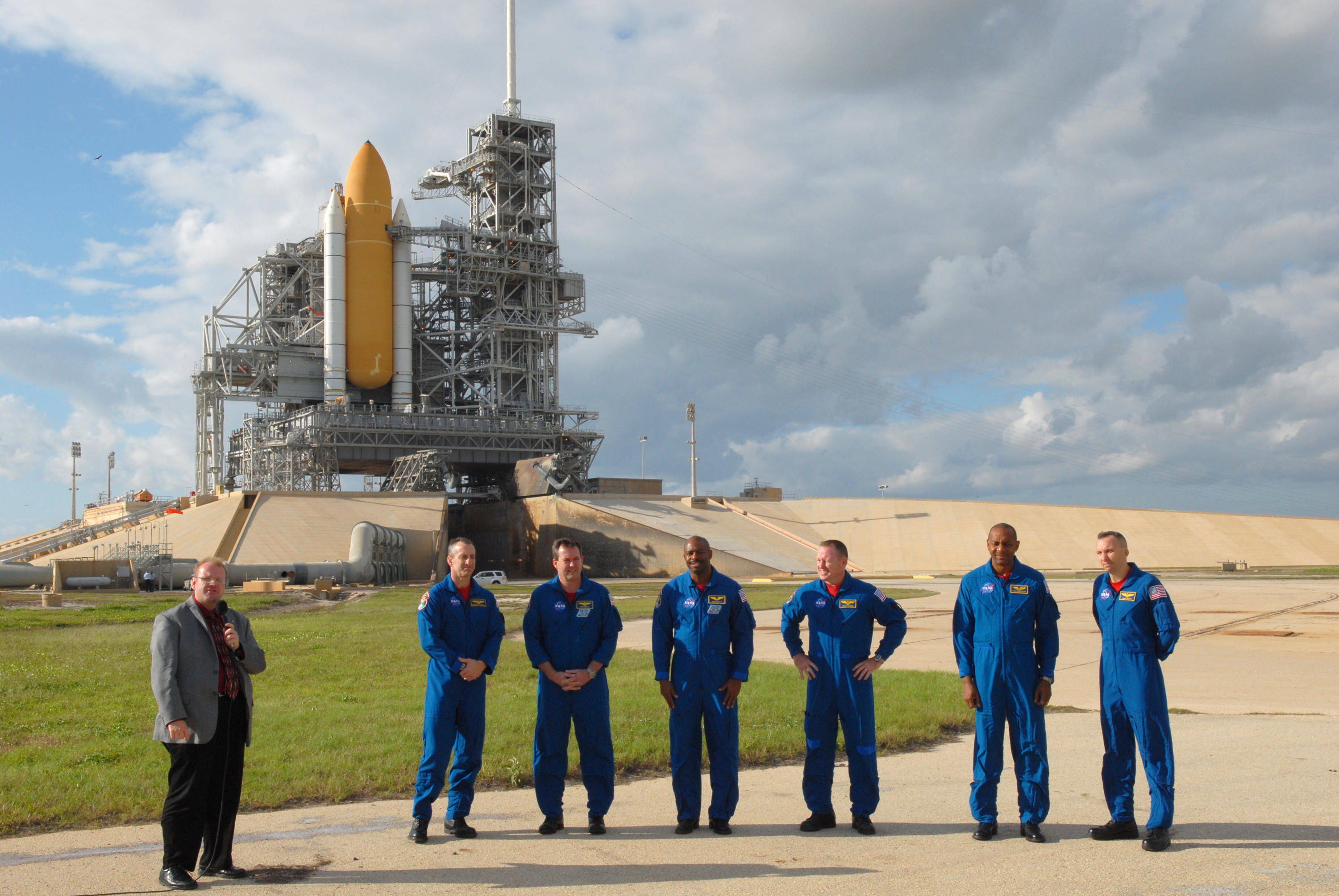
Left: Atlantis rolls out to Launch Pad 39A. Right: The STS-129 crew during the Terminal Countdown Demonstration Test.
Atlantis returned to NASA’s Kennedy Space Center (KSC) from its previous mission, STS-125, on June 2, 2009, and workers towed it to the Orbiter Processing Facility (OPF) to prepare it for STS-129. The orbiter rolled over to the Vehicle Assembly Building on Oct. 6, and after mating with its external tank and twin solid rocket boosters, rolled out to Launch Pad 39A on Oct. 14, targeting a Nov. 16 launch. Six days later, the six-member crew participated in the Terminal Countdown Demonstration Test, essentially a dress rehearsal of the actual countdown for launch, returning to Houston for final training. They returned to KSC on Nov. 13 to prepare for launch.


Left: With Atlantis sitting on Launch Pad 39A, the Ares 1-X rocket lifts off from Launch Pad 39B. Right: The payload canister arrives at Launch Pad 39A.
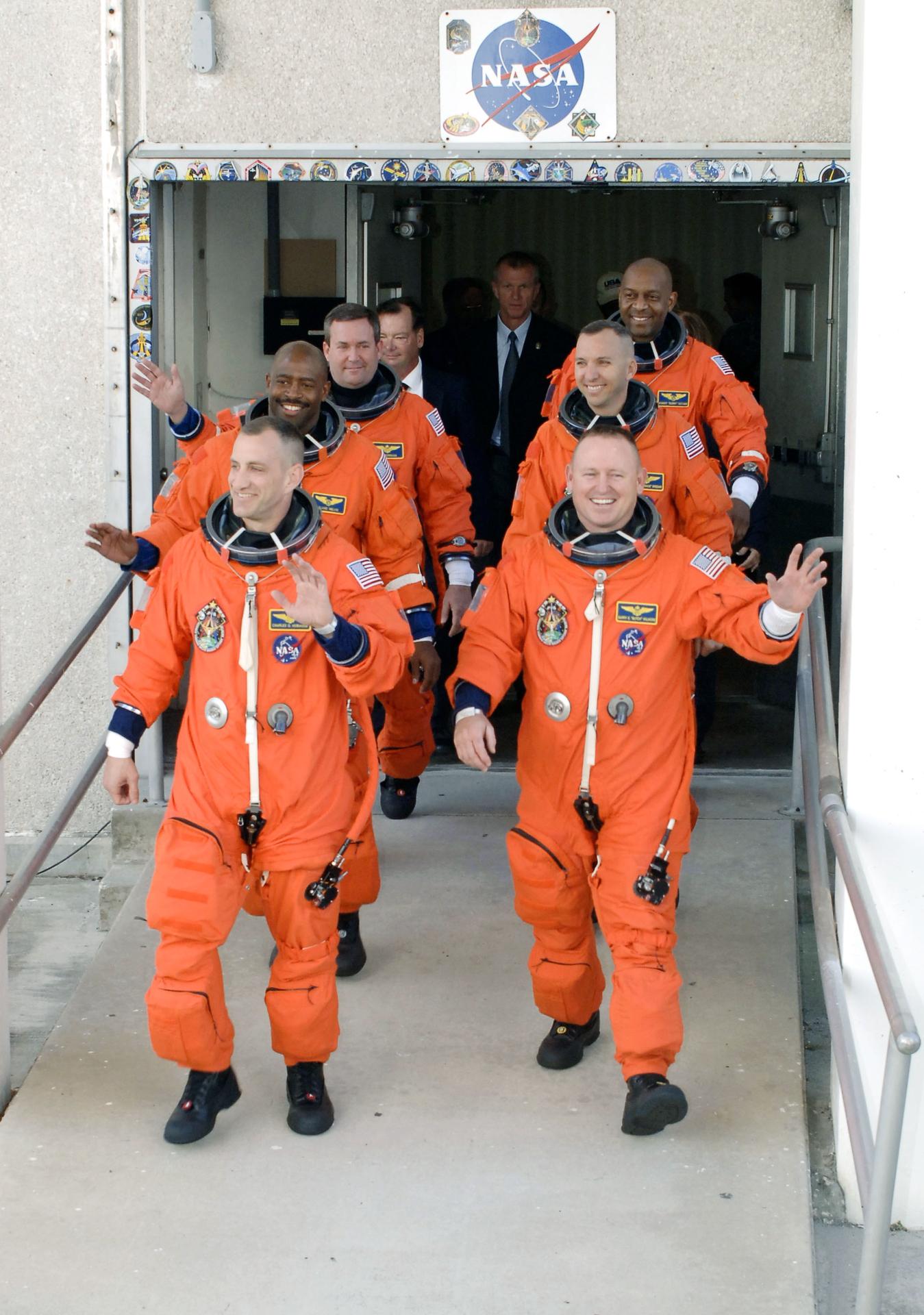
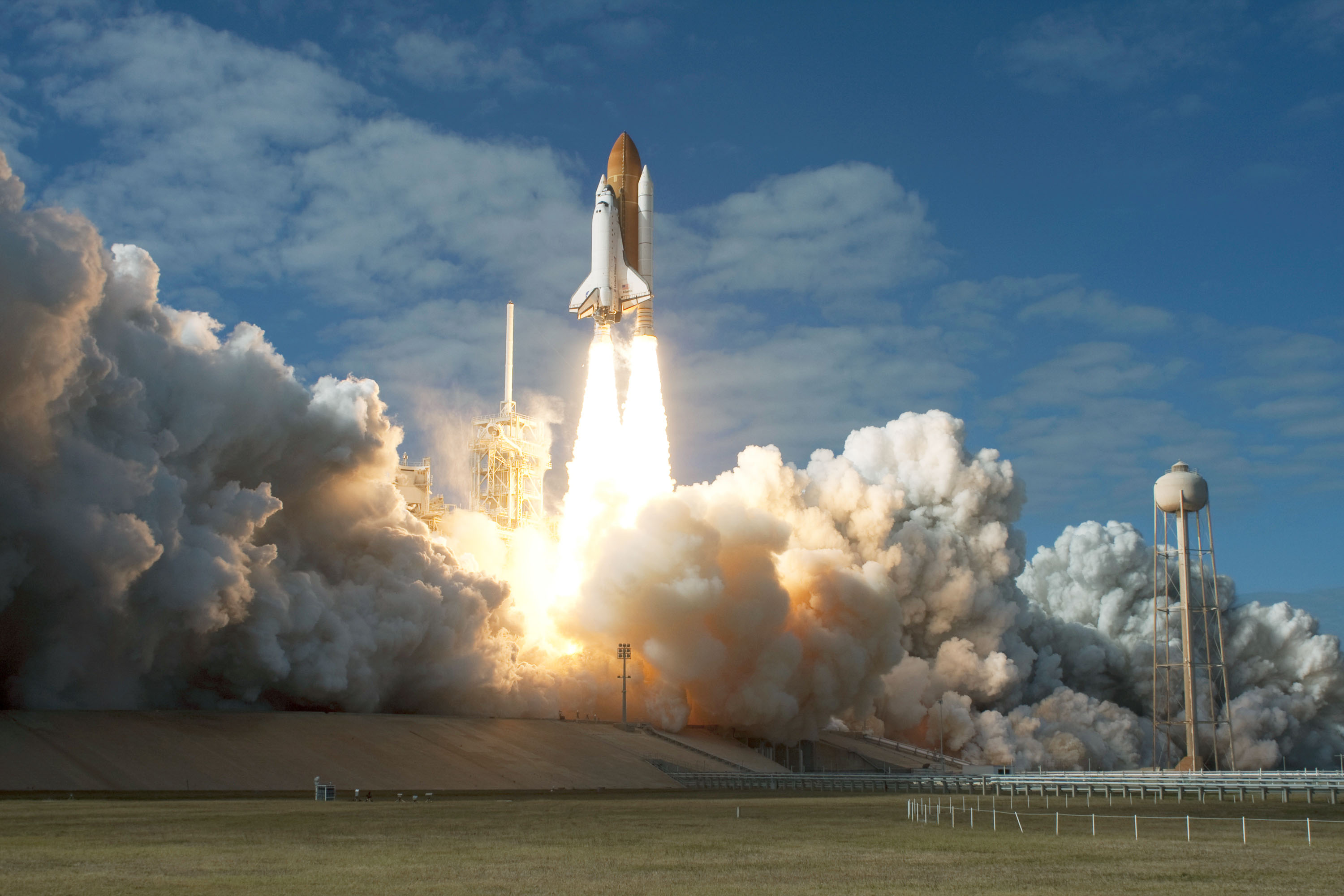
Left: The STS-129 astronauts leave crew quarters for the ride to Launch Pad 39A. Right: Liftoff of space shuttle Atlantis on STS-129.
On Nov. 16, at 2:28 p.m. EST, space shuttle Atlantis lifted off from Launch Pad 39A to begin its 31st trip into space, carrying its six-member crew on the ULF3 space station outfitting and resupply mission. Eight and a half minutes later, Atlantis and its crew had reached orbit. The flight marked Hobaugh’s third time in space, having flown on STS-104 and STS-118, Foreman’s and Melvin’s second, having flown on STS-123 and STS-122, respectively, while Wilmore, Bresnik, and Satcher enjoyed their first taste of weightlessness.
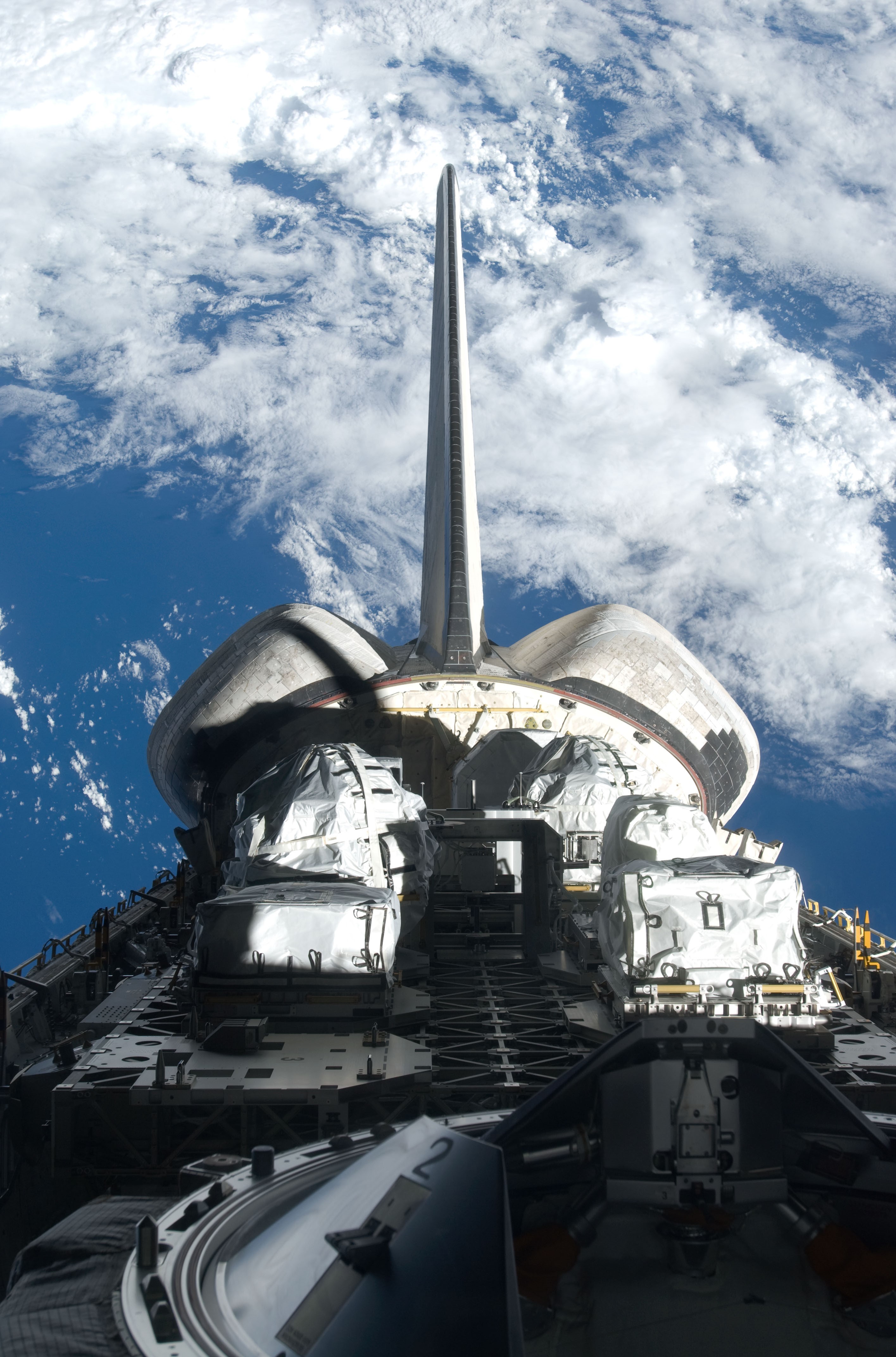
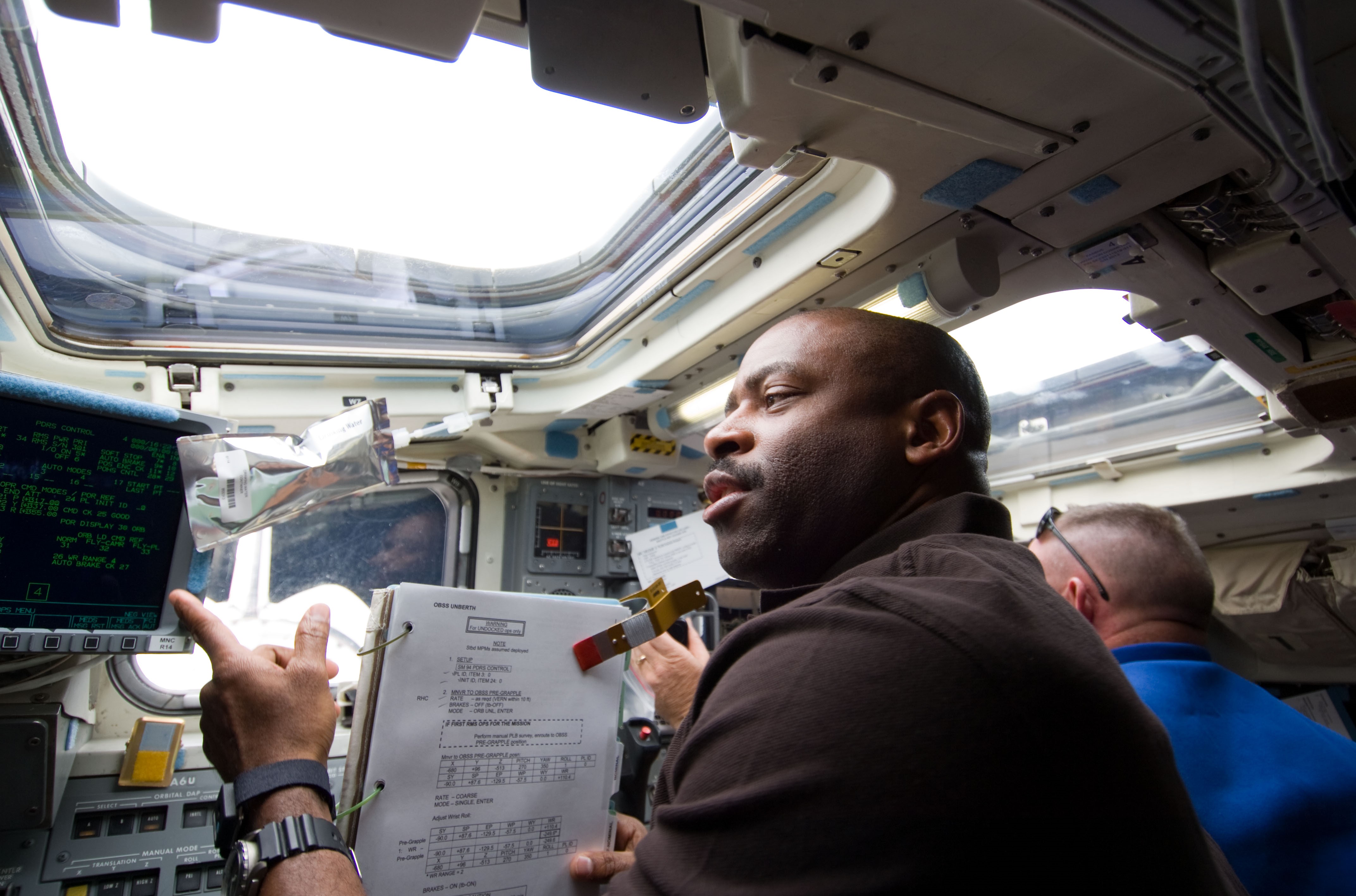
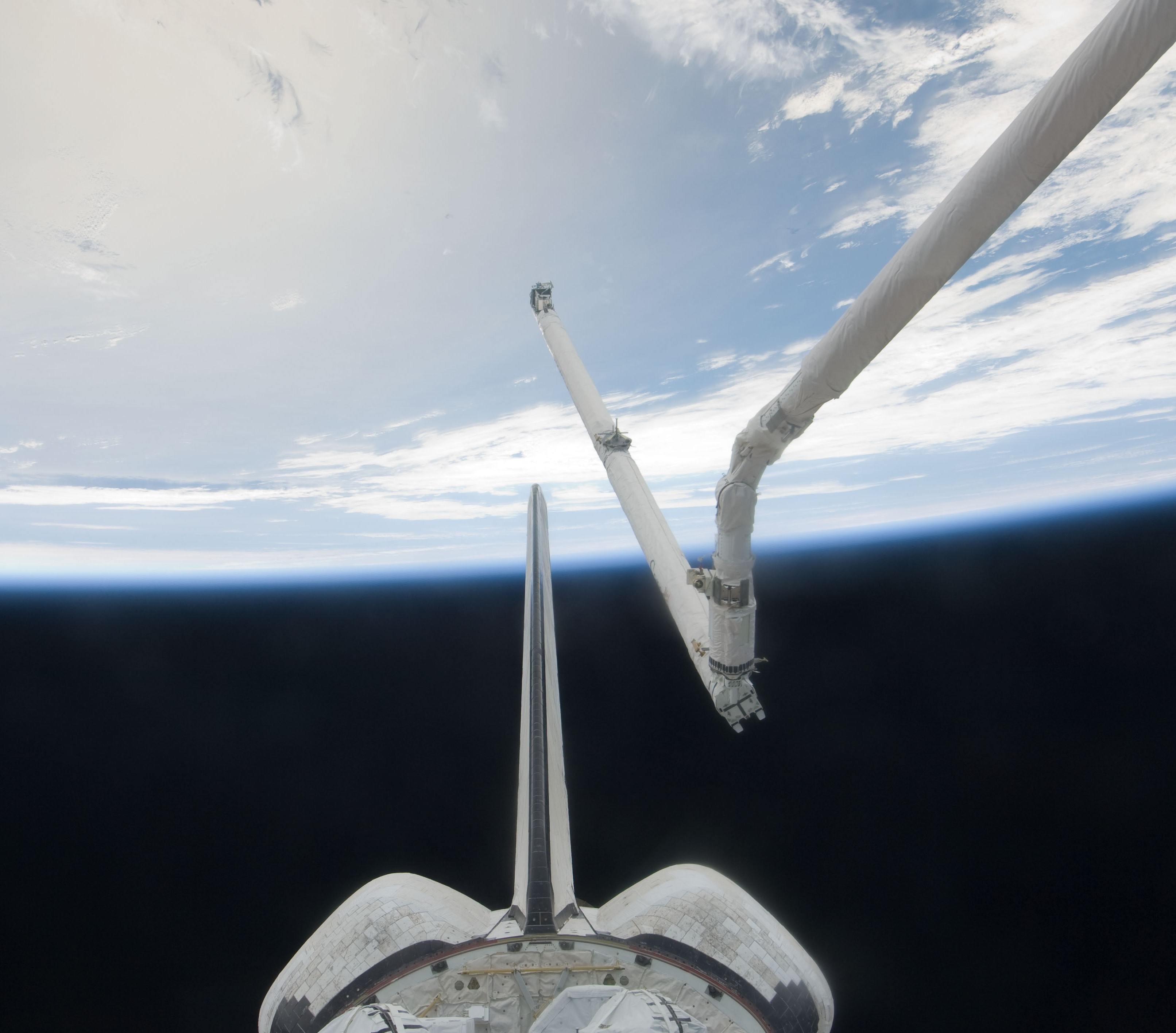
Left: The two EXPRESS Logistics Carriers in Atlantis’ payload bay. Middle: Leland D. Melvin participates in the inspection of Atlantis’ thermal protection system. Right: The Shuttle Remote Manipulator System grasps the Orbiter Boom Sensor System for the inspection.
After reaching orbit, the crew opened the payload bay doors, deployed the shuttle’s radiators, and removed their bulky launch and entry suits, stowing them for the remainder of the flight. The astronauts spent six hours on their second day in space conducting a detailed inspection of Atlantis’ nose cap and wing leading edges, with Hobaugh, Wilmore, Melvin, and Bresnik taking turns operating the Shuttle Remote Manipulator System (SRMS), or robotic arm, and the Orbiter Boom Sensor System (OBSS).
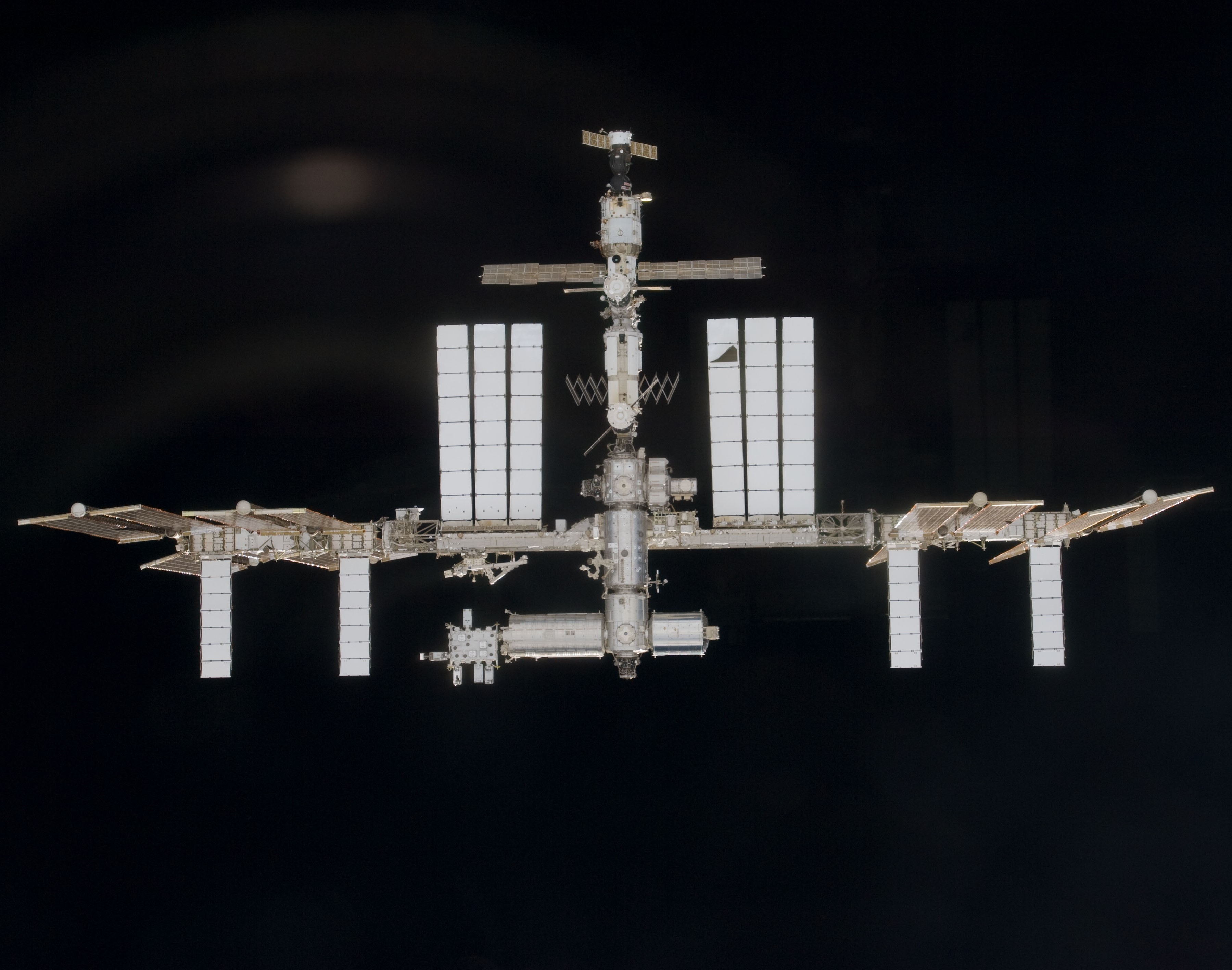
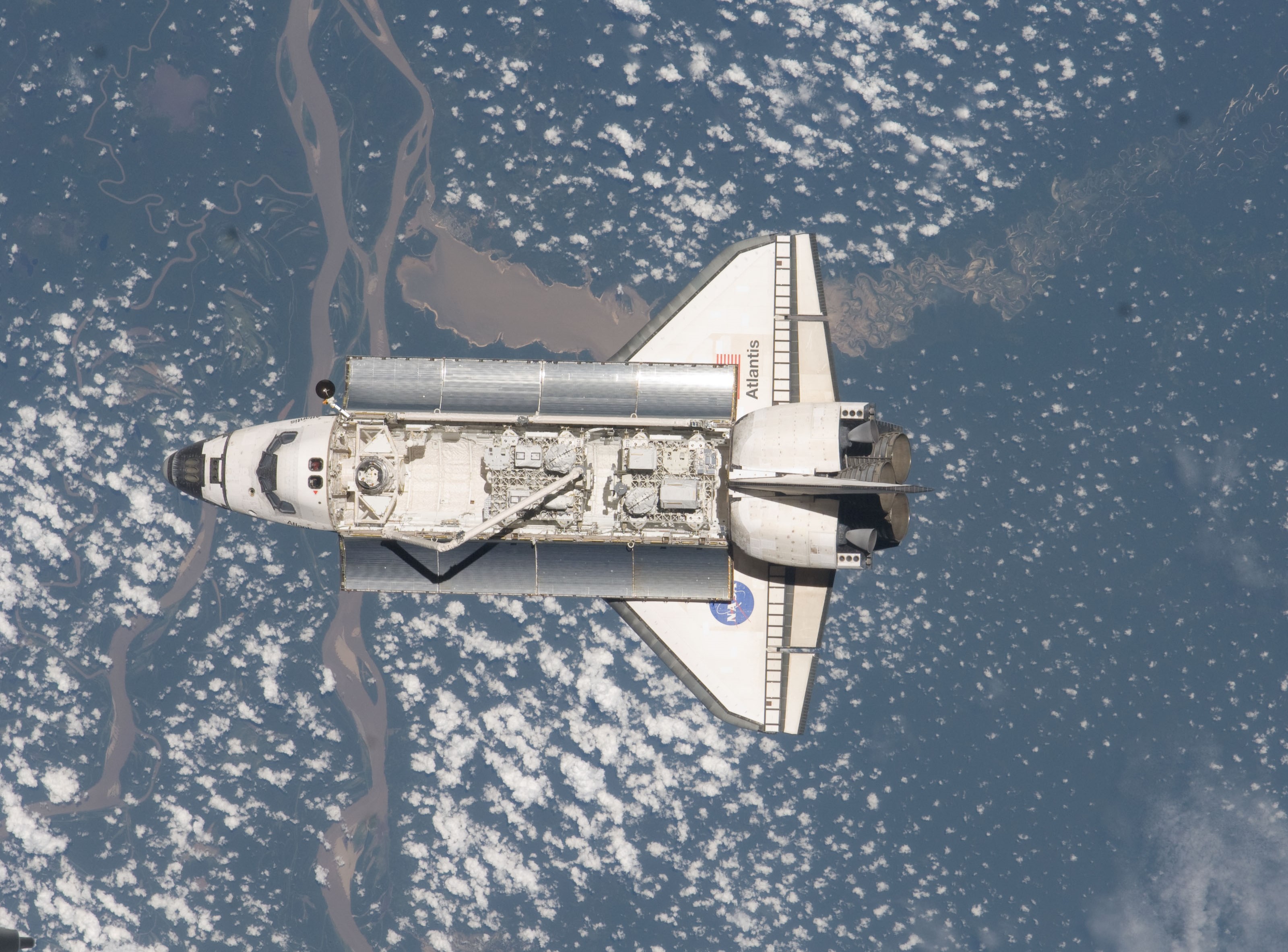
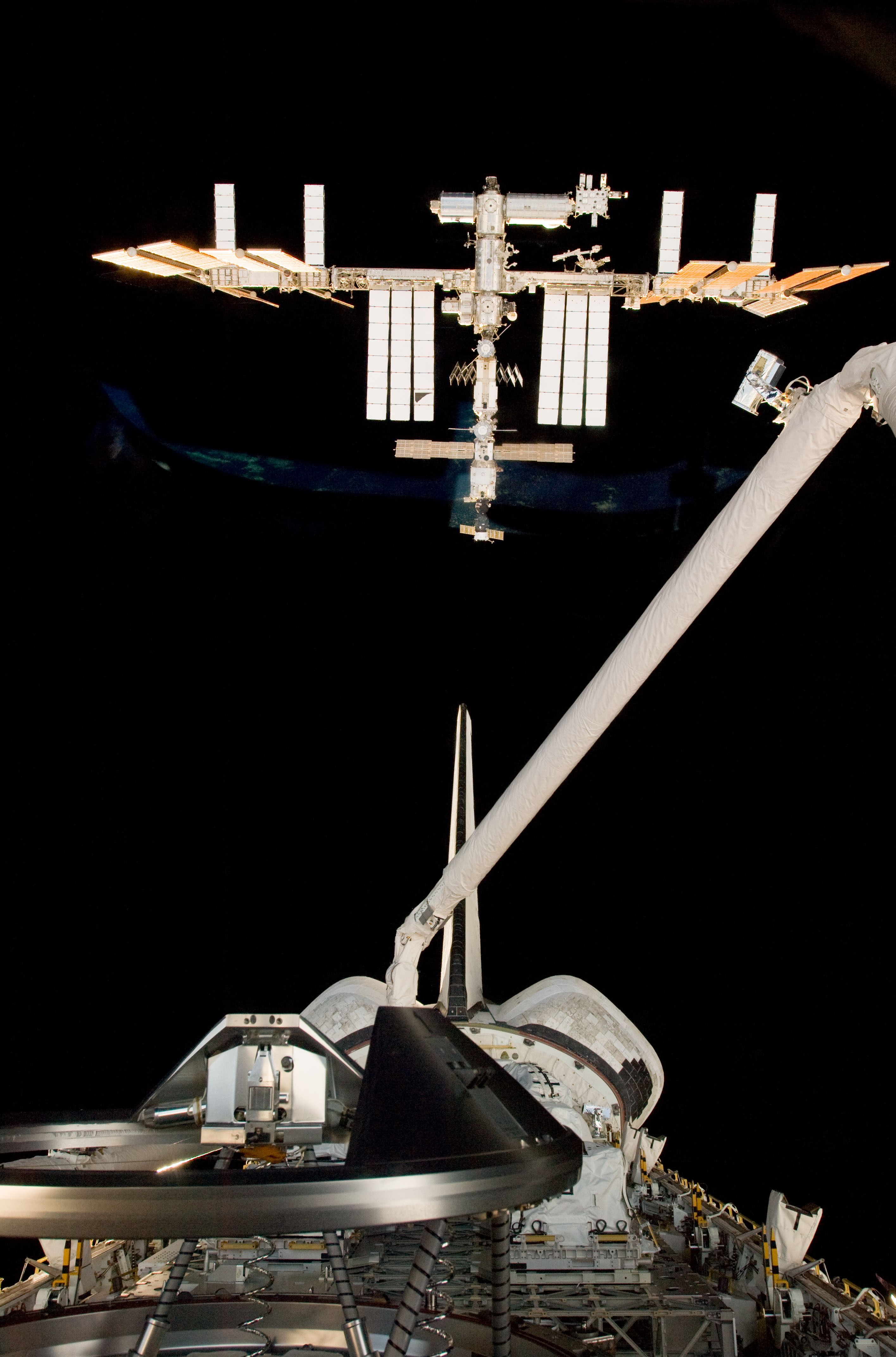
Left: The International Space Station as seen from Atlantis during the rendezvous and docking maneuver. Middle: Atlantis as seen from the space station, showing the two EXPRESS Logistics Carriers (ELC) in the payload bay. Right: View of the space station from Atlantis during the rendezvous pitch maneuver, with the Shuttle Remote Manipulator System grasping ELC-1 in preparation for transfer shortly after docking.
On the mission’s third day, Hobaugh assisted by his crewmates brought Atlantis in for a docking with the space station. During the rendezvous, Hobaugh stopped the approach at 600 feet and completed the Rendezvous Pitch Maneuver so astronauts aboard the station could photograph Atlantis’ underside to look for any damage to the tiles. Shortly after docking, the crews opened the hatches between the two spacecraft and the six-person station crew welcomed the six-member shuttle crew. After the welcoming ceremony, Stott joined the STS-129 crew, leaving a crew of five aboard the station. Melvin and Bresnik used the SRMS to pick up ELC-1 from the payload bay and hand it off to Wilmore and Expedition 21 NASA astronaut Jeffrey N. Williams operating the Space Station Remote Manipulator System (SSRMS), who then installed it on the P3 truss segment.
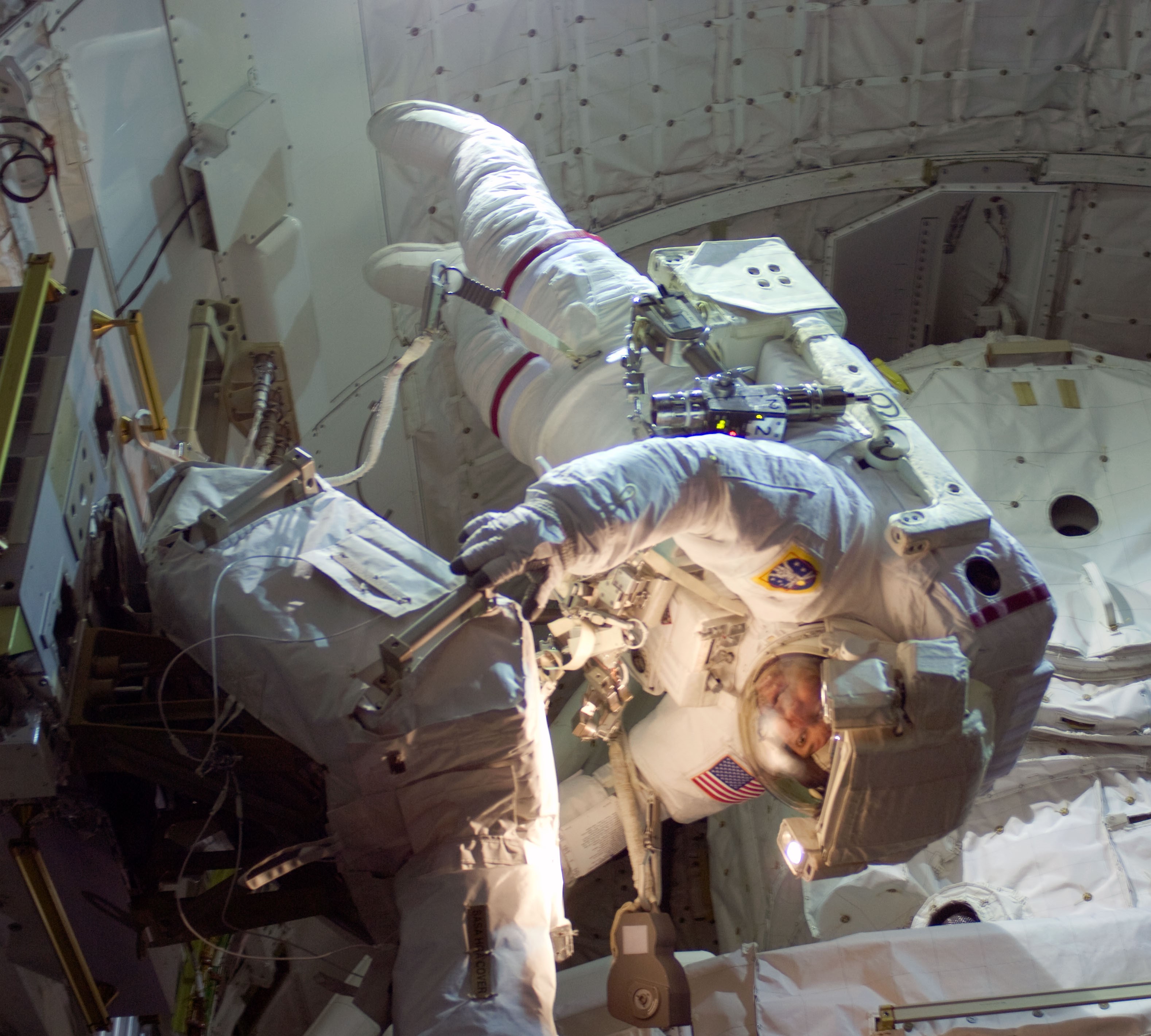
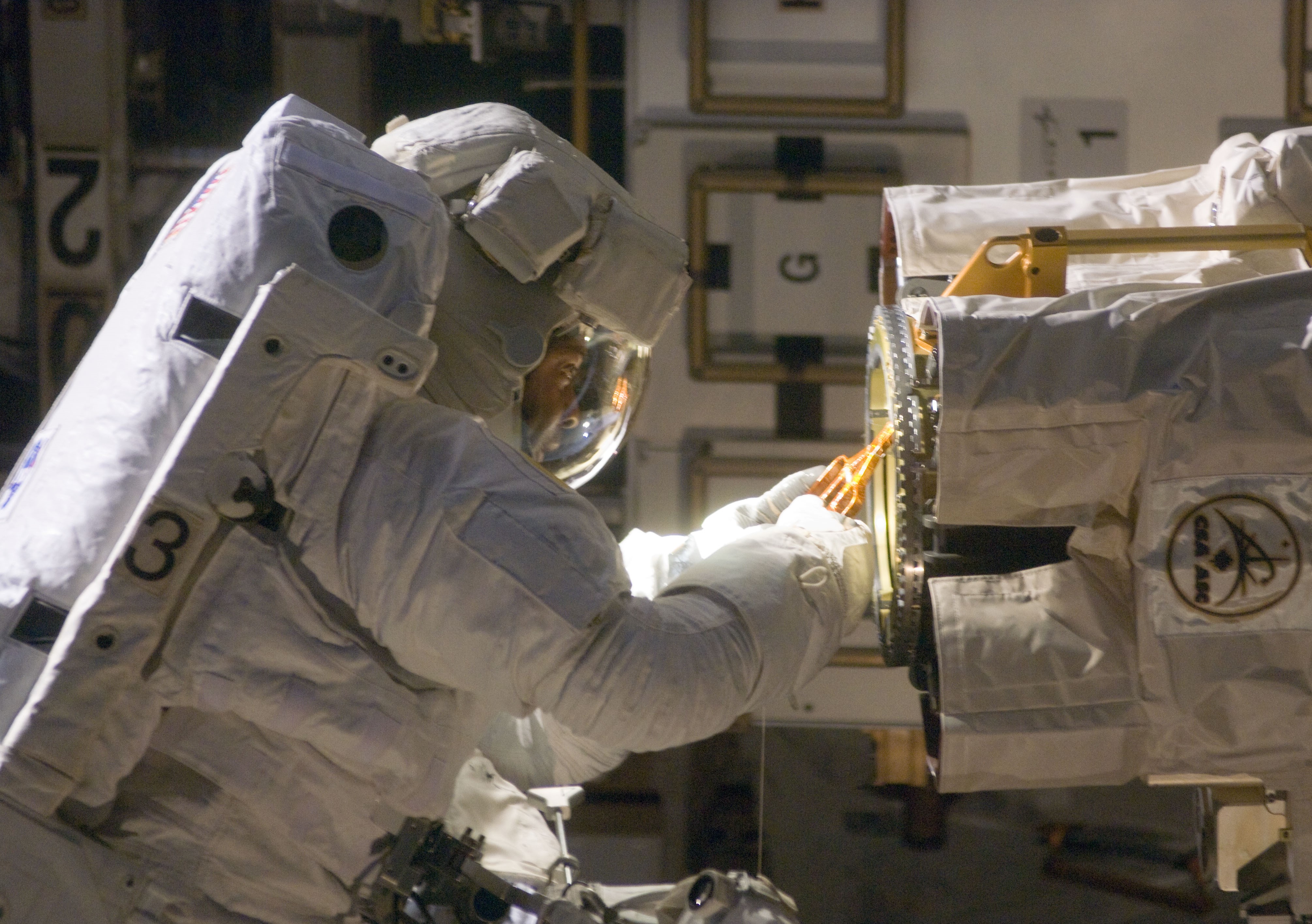

Images from the first spacewalk. Left: Michael J. Foreman unstows the S-band Antenna Support Assembly prior to transferring it to the station. Middle: Robert “Bobby” L. Satcher lubricates the robotic arm’s Latching End Effector. Right: Satcher’s image reflected in a Z1 radiator panel.
During the mission’s first of three spacewalks on flight day four, Foreman and Satcher ventured outside for six hours and 37 minutes. During the excursion, with robotic help from their fellow crew members, they transferred a spare S-band Antenna Support Assembly from the shuttle’s payload bay to the station’s Z1 truss. Satcher, an orthopedic surgeon by training, performed “surgery” on the station’s main robotic arm as well as the robotic arm on the Kibo Japanese module, by lubricating their latching end effectors. One day after joining Atlantis’ crew, Stott celebrated her 47th birthday.

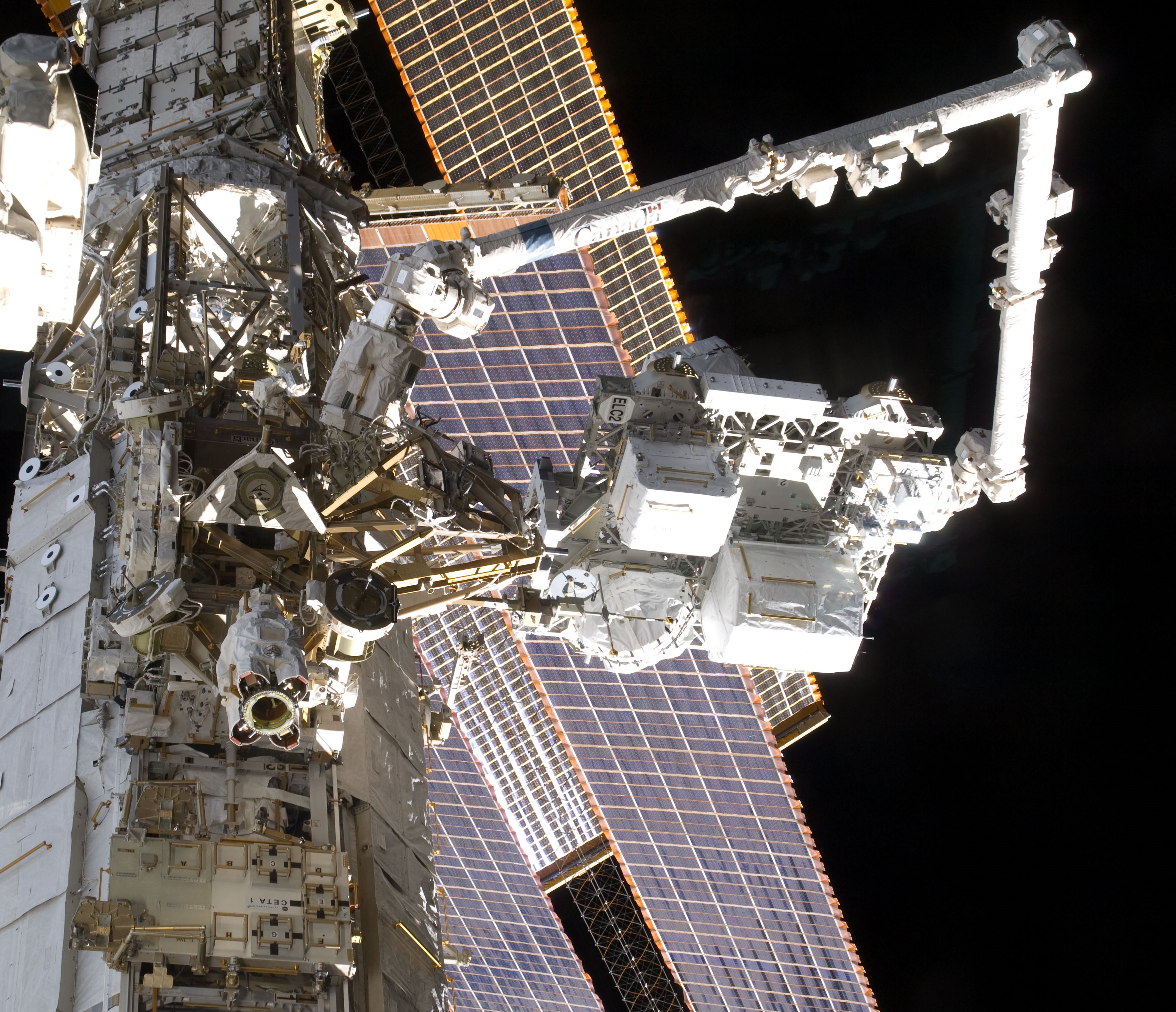
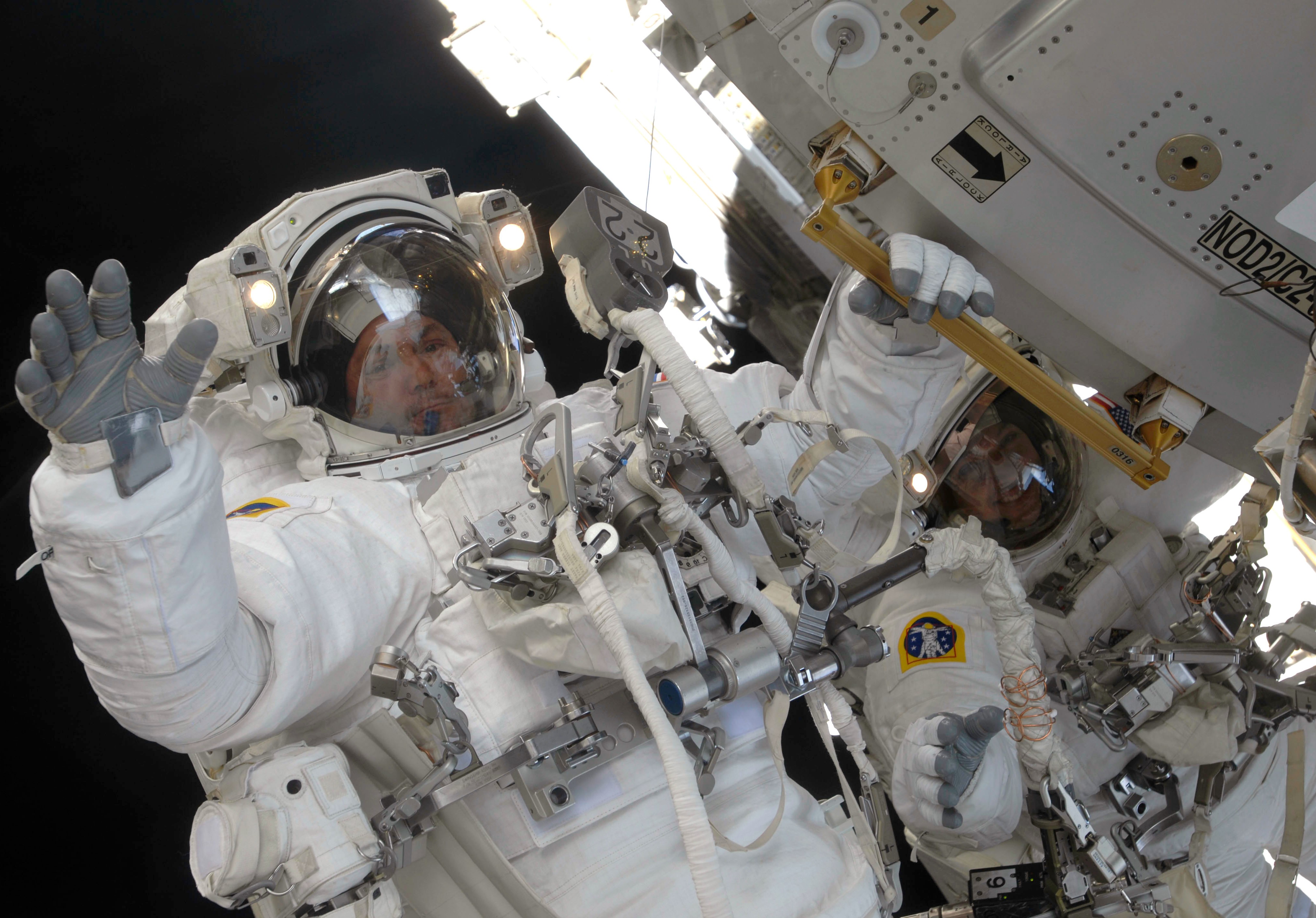
Left: Space station crew member Jeffery N. Williams assists STS-129 astronaut Leland D. Melvin in operating the space station’s robotic arm to transfer and install the second EXPRESS Logistics Carrier (ELC2) on the S3 truss. Middle: The station robotic arm installs ELC2 on the S3 truss. Right: Michael J. Foreman, left, and Randolph J. Bresnik during the mission’s second spacewalk.
On the mission’s fifth day, the astronauts performed another focused inspection of the shuttle’s thermal protection system. The next day, through another coordinated robotic activity involving the shuttle and station arms, the astronauts transferred ELC-2 and its complement of spares from the payload bay to the station’s S3 truss. Foreman and Bresnik completed the mission’s second spacewalk. Working on the Columbus module, they installed the Grappling Adaptor to On-Orbit Railing (GATOR) fixture that includes a system used for ship identification and an antenna for Ham radio operators. They next installed a wireless video transmission system on the station’s truss. This spacewalk lasted six hours and eight minutes.
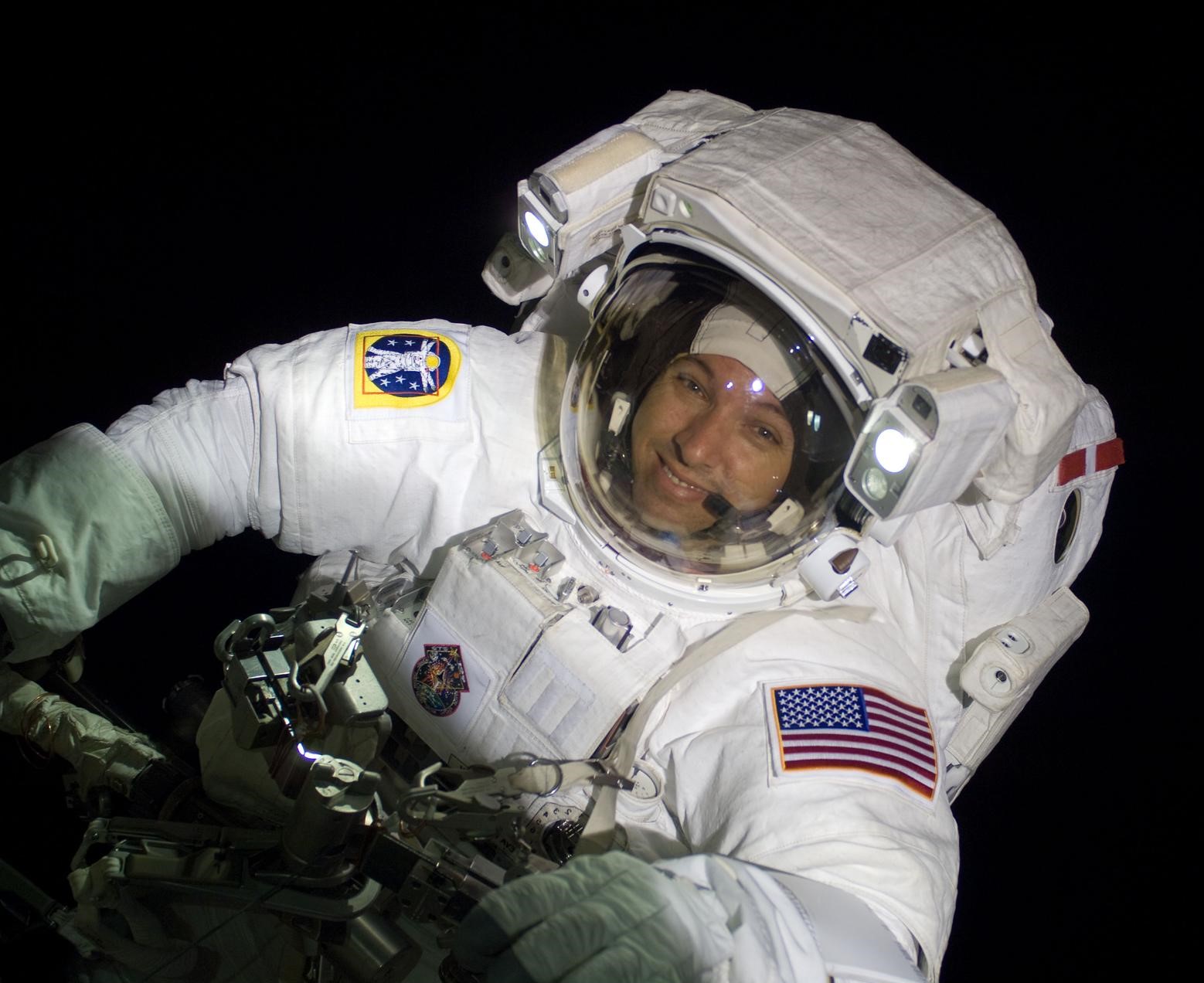

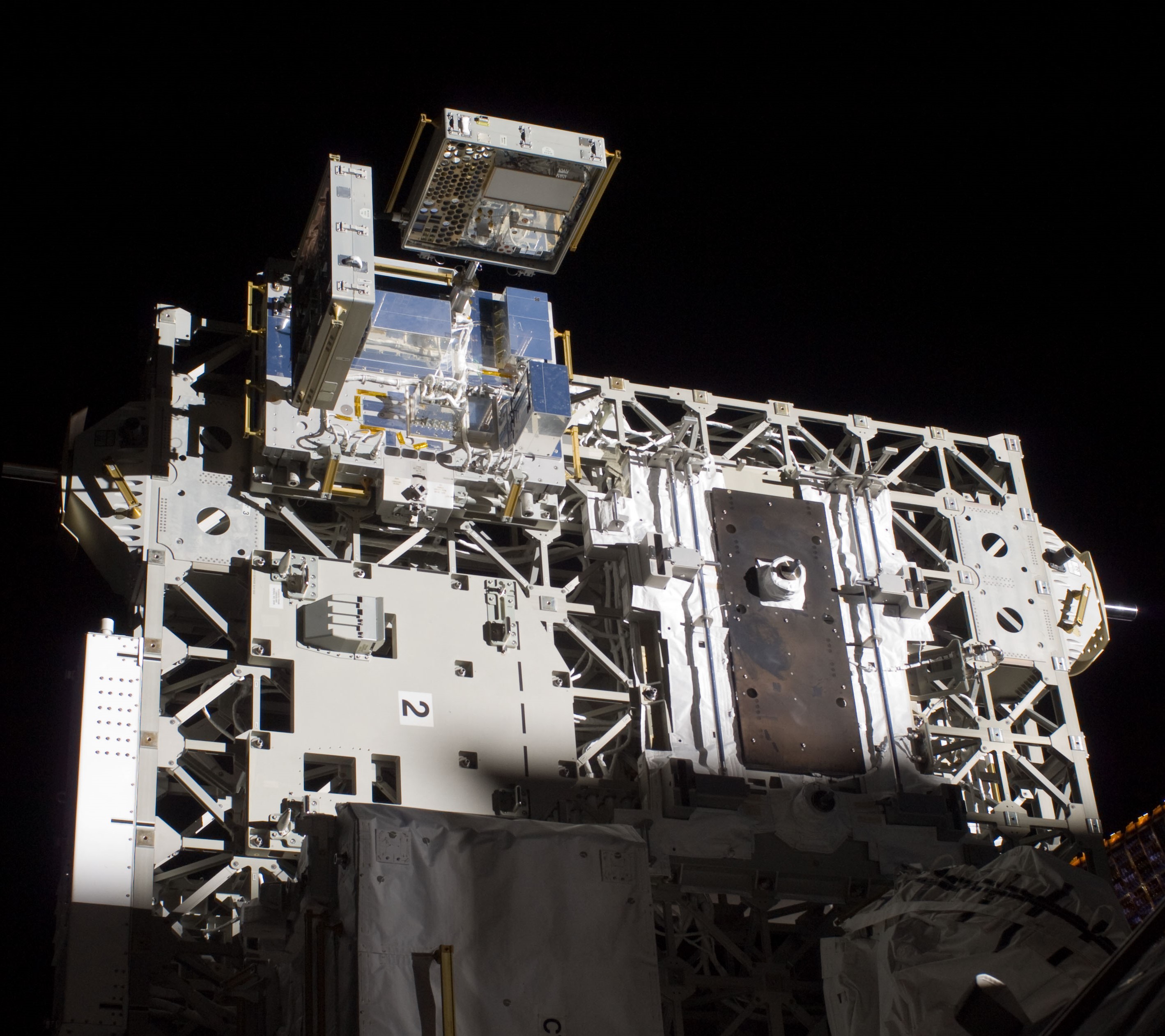
Left: Randolph J. Bresnik during the third STS-129 spacewalk. Middle: Robert “Bobby” L. Satcher during the third spacewalk. Right: The MISSE 7 exposure experiment suitcases installed on ELC2.
Following a crew off duty day, on flight day eight Satcher and Bresnik exited the airlock for the mission’s third and final spacewalk. Their first task involved moving an oxygen tank from the newly installed ELC-2 to the Quest airlock. They accomplished this task with robotic assistance from their fellow crew members. Bresnik retrieved the two-suitcase sized MISSE-7 experiment containers from the shuttle cargo bay and installed them on the MISSE-7 platform on ELC-2, opening them to begin their exposure time. This third spacewalk lasted five hours 42 minutes.
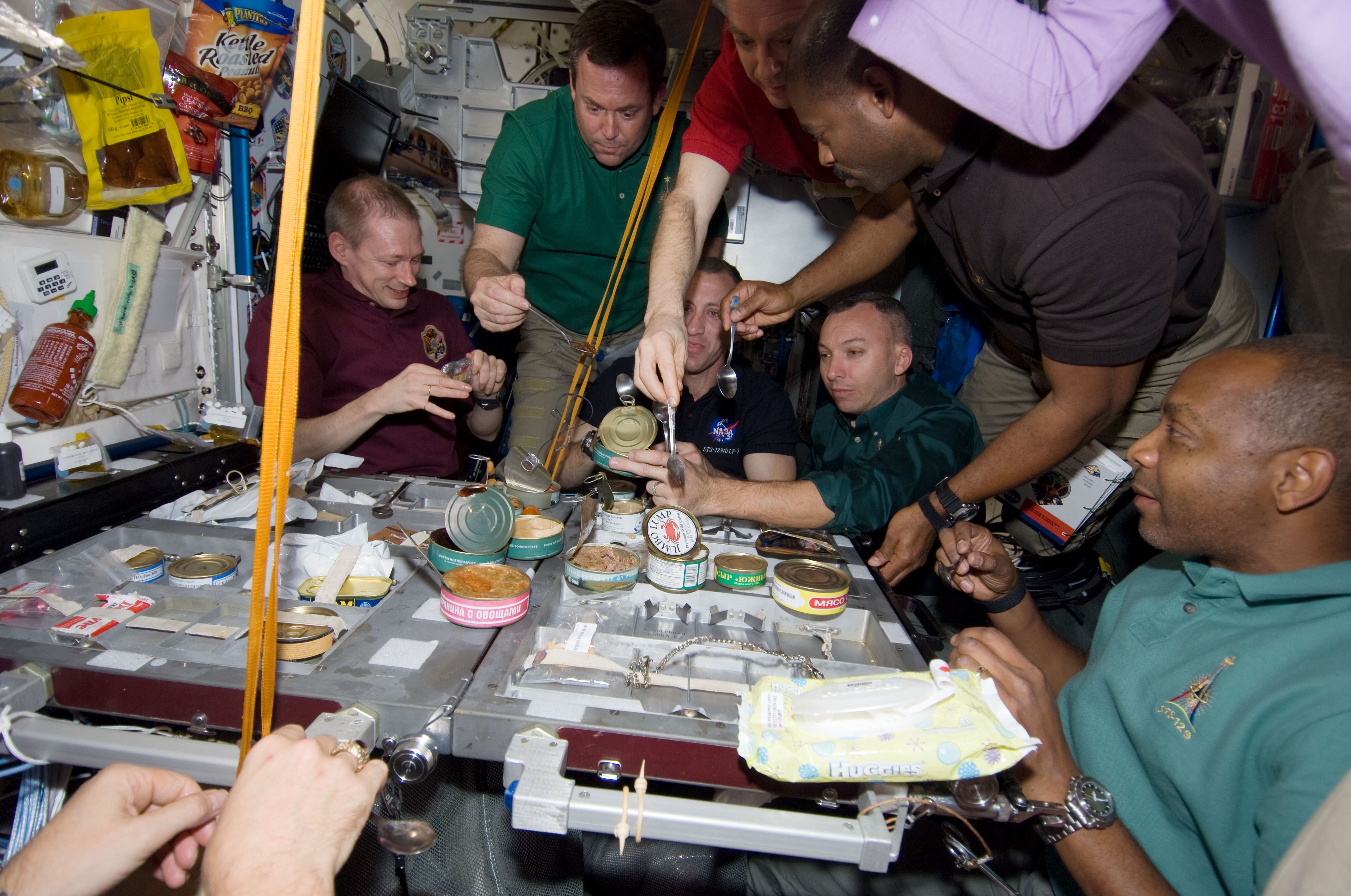

Left: An early Thanksgiving meal for 12 aboard the space station. Right: After the meal, who has the dishes?
Thanksgiving Day fell on the day after undocking, so the joint crews celebrated with a meal a few days early. The meal represented not only the largest Thanksgiving celebration in space with 12 participants, but also the most international, with four nations represented – the United States, Russia, Canada, and Belgium (representing the European Space Agency).


Left: The 12 members of Expedition 21 and STS-129 pose for a final photograph before saying their farewells. Right: The STS-129 crew, now comprising seven members.

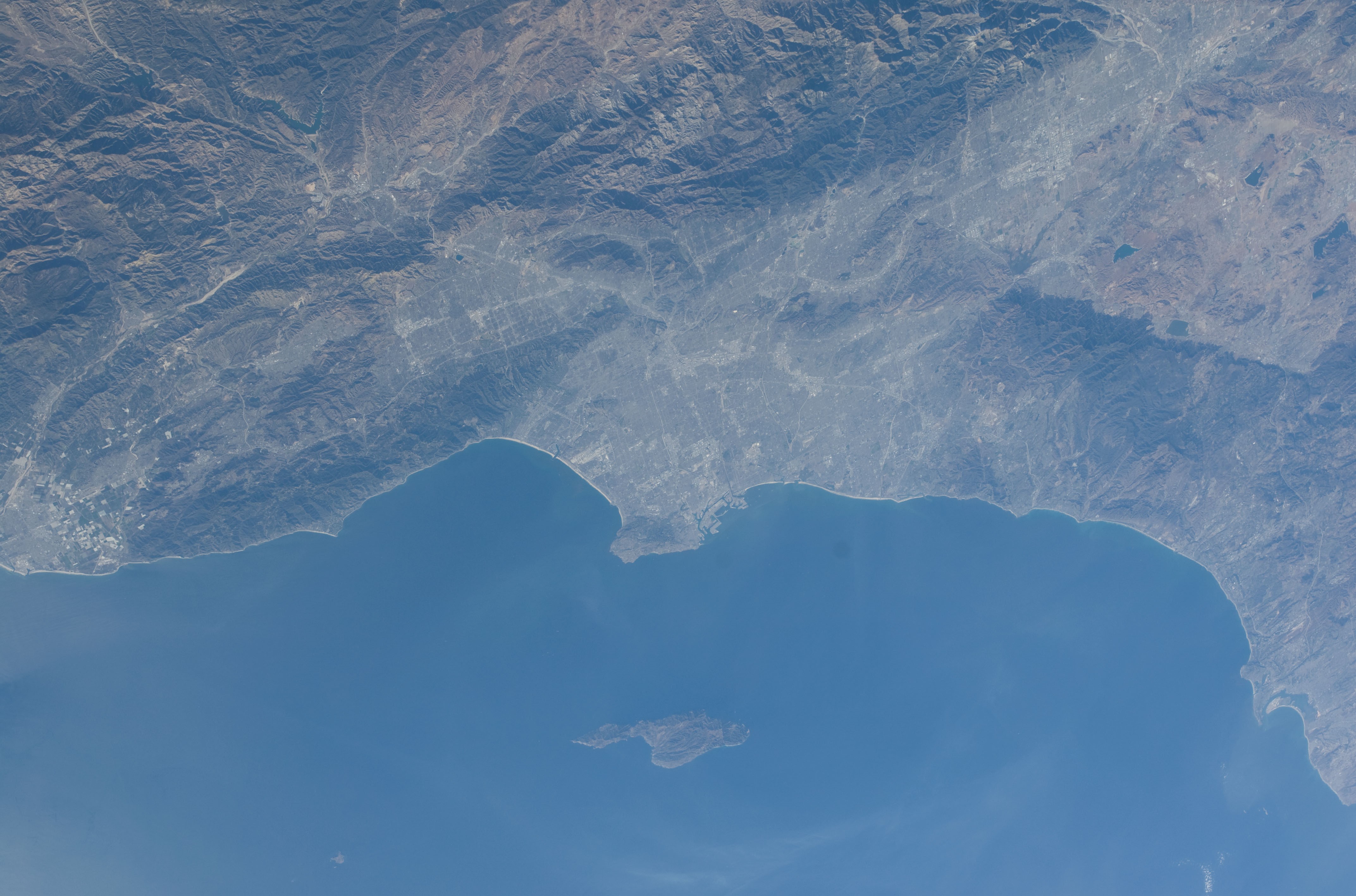

A selection of STS-129 Earth observation images. Left: Maui. Middle: Los Angeles. Right: Houston.
Despite their busy workload, as with all space crews, the STS-129 astronauts made time to look out the windows and took hundreds of photographs of their home planet.
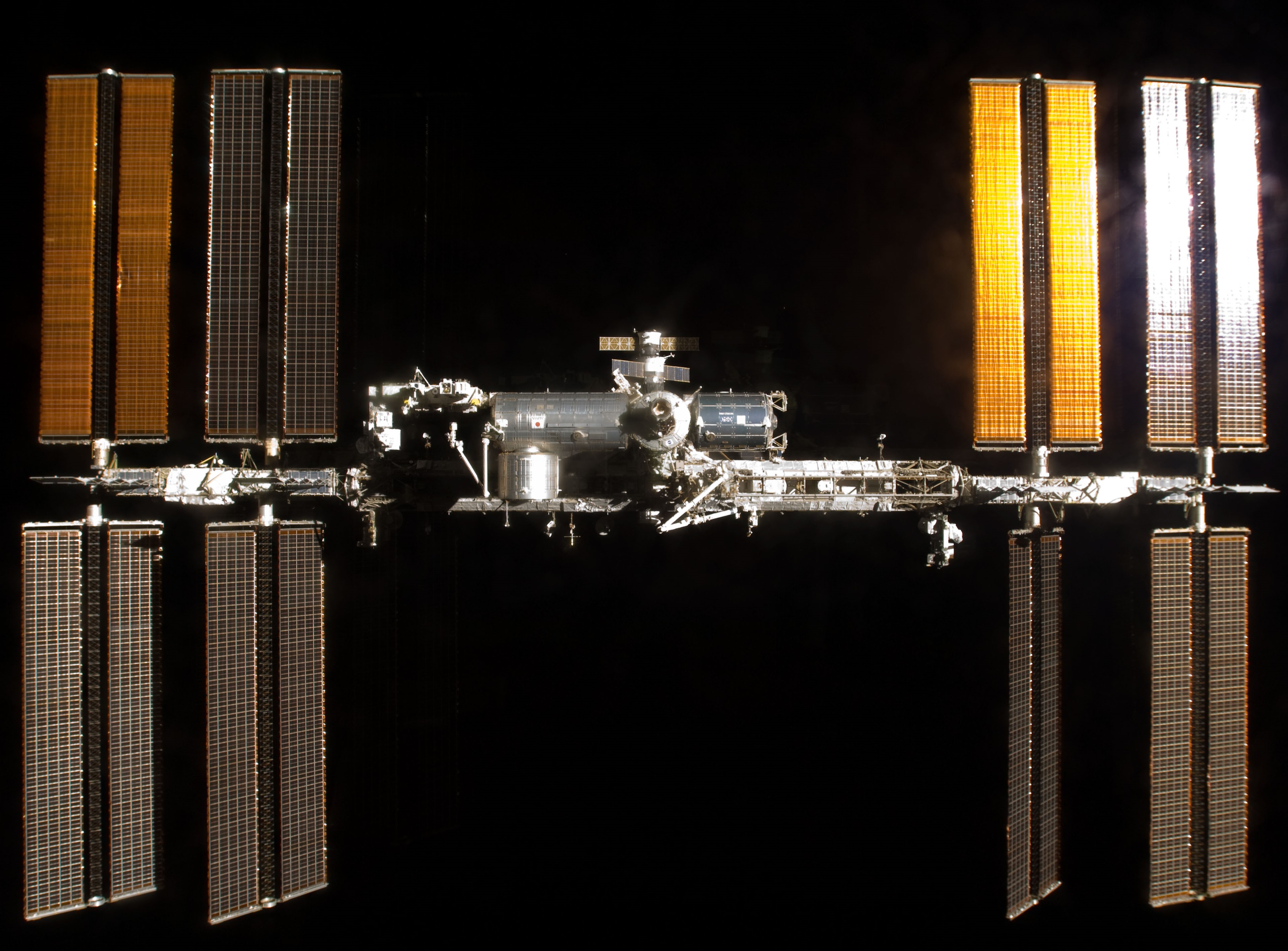
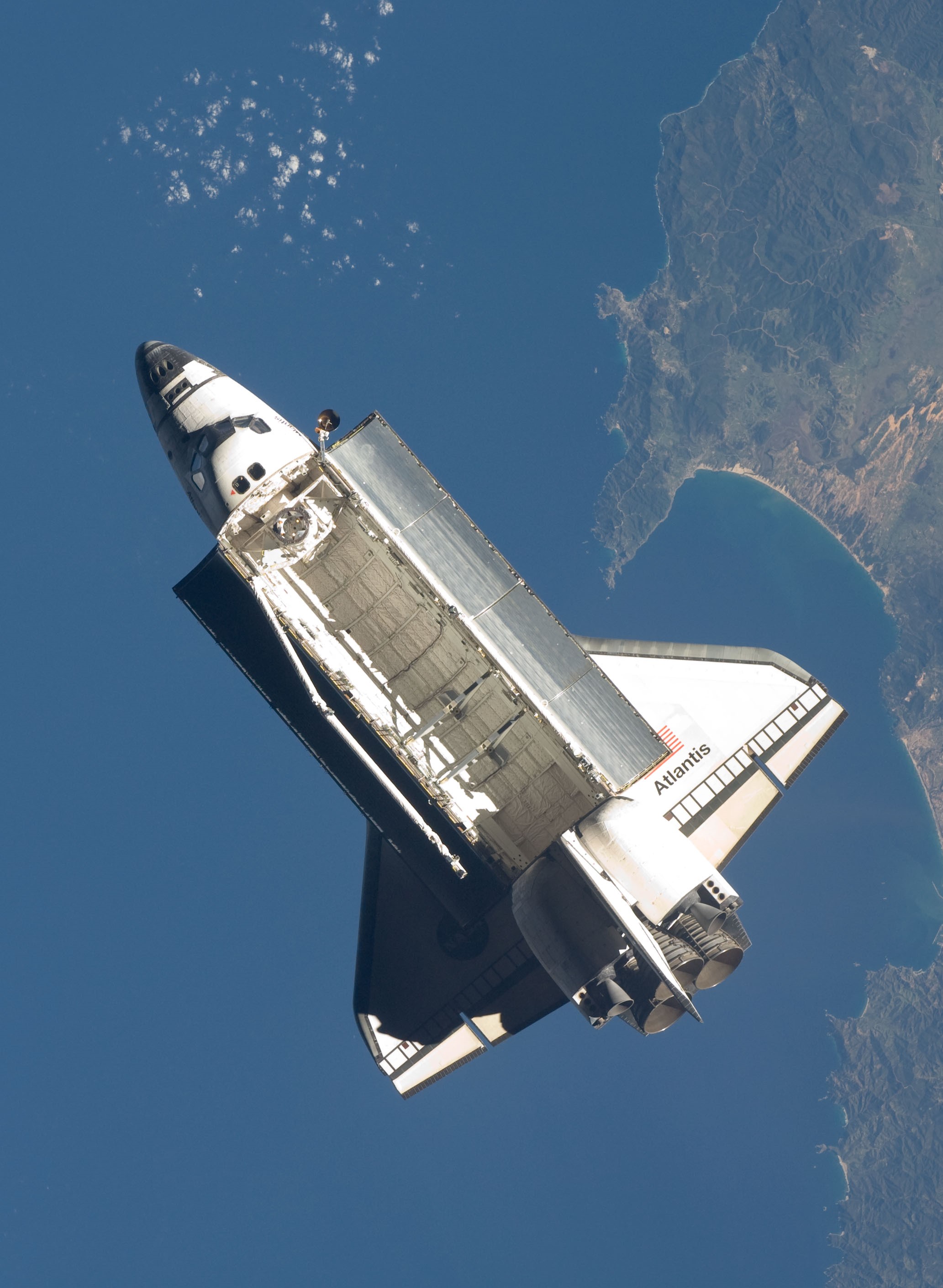
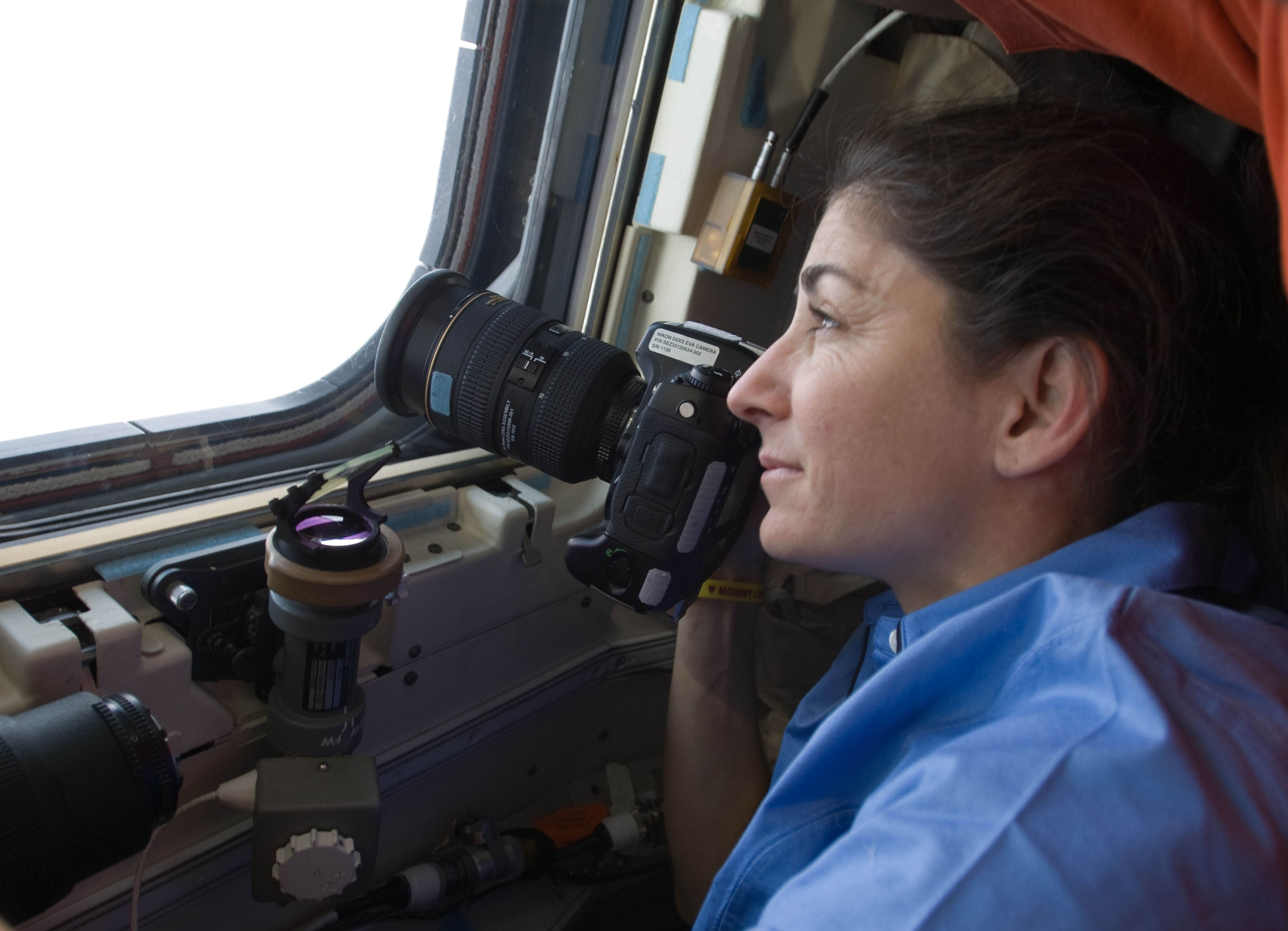
Left: The space station seen from Atlantis during the flyaround. Middle: Atlantis as seen from the space station during the flyaround, with a now empty payload bay. Right: Astronaut Nicole P. Stott looks back at the station, her home for three months, from the departing Atlantis.
On flight day nine, the joint crews held a brief farewell ceremony. European Space Agency astronaut Frank De Winne, the first European to command the space station, handed over command to NASA astronaut Williams. The two crews parted company and closed the hatches between the two spacecraft. The next day, with Wilmore at the controls, Atlantis undocked from the space station, having spent seven days as a single spacecraft. Wilmore completed a flyaround of the station, with the astronauts photographing it to document its condition. A final separation burn sent Atlantis on its way.
The astronauts used the shuttle’s arm to pick up the OBSS and perform a late inspection of Atlantis’ thermal protection system. On flight day 11, Hobaugh and Wilmore tested the orbiter’s reaction control system thrusters and flight control surfaces in preparation for the next day’s entry and landing. The entire crew busied themselves with stowing all unneeded equipment.
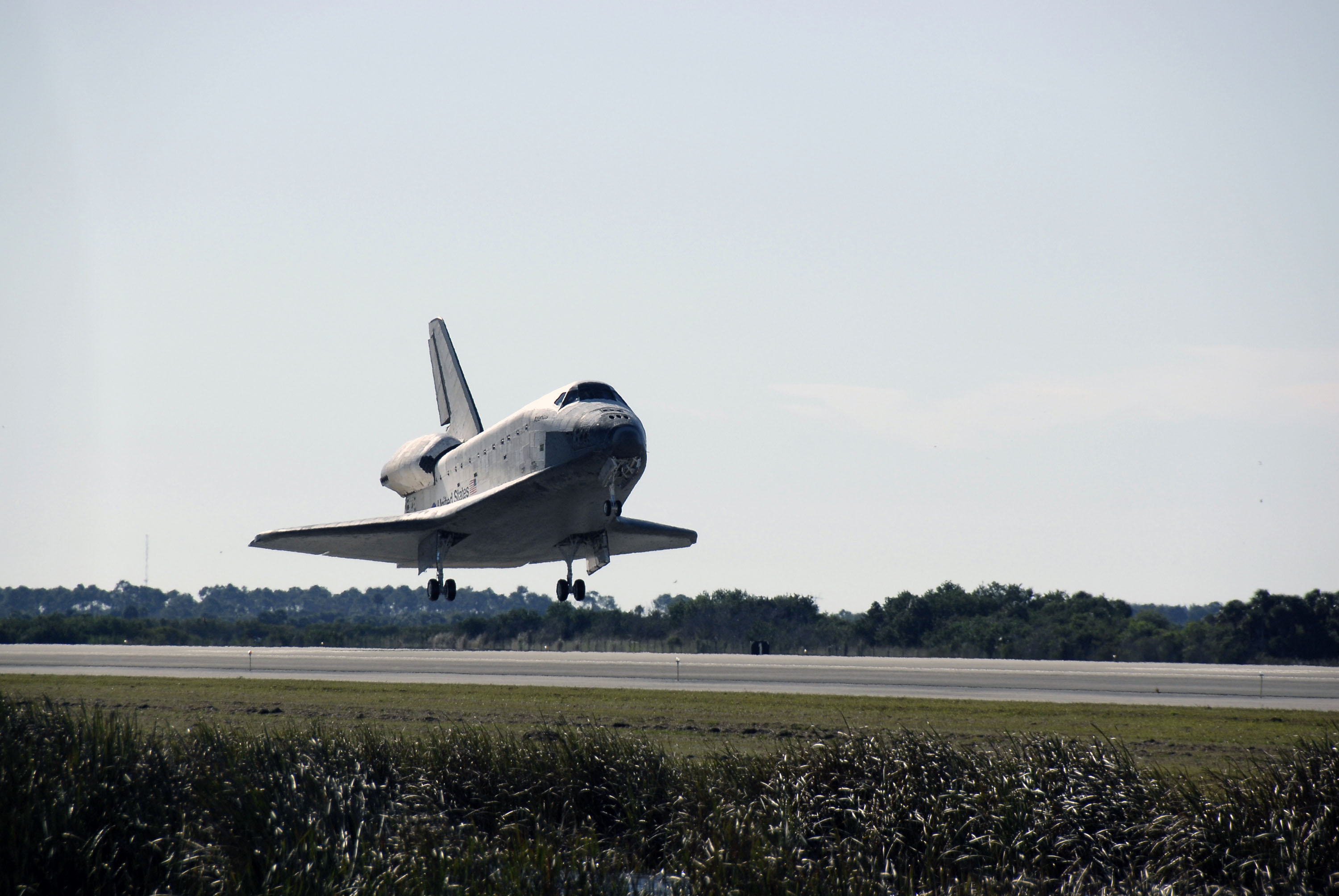
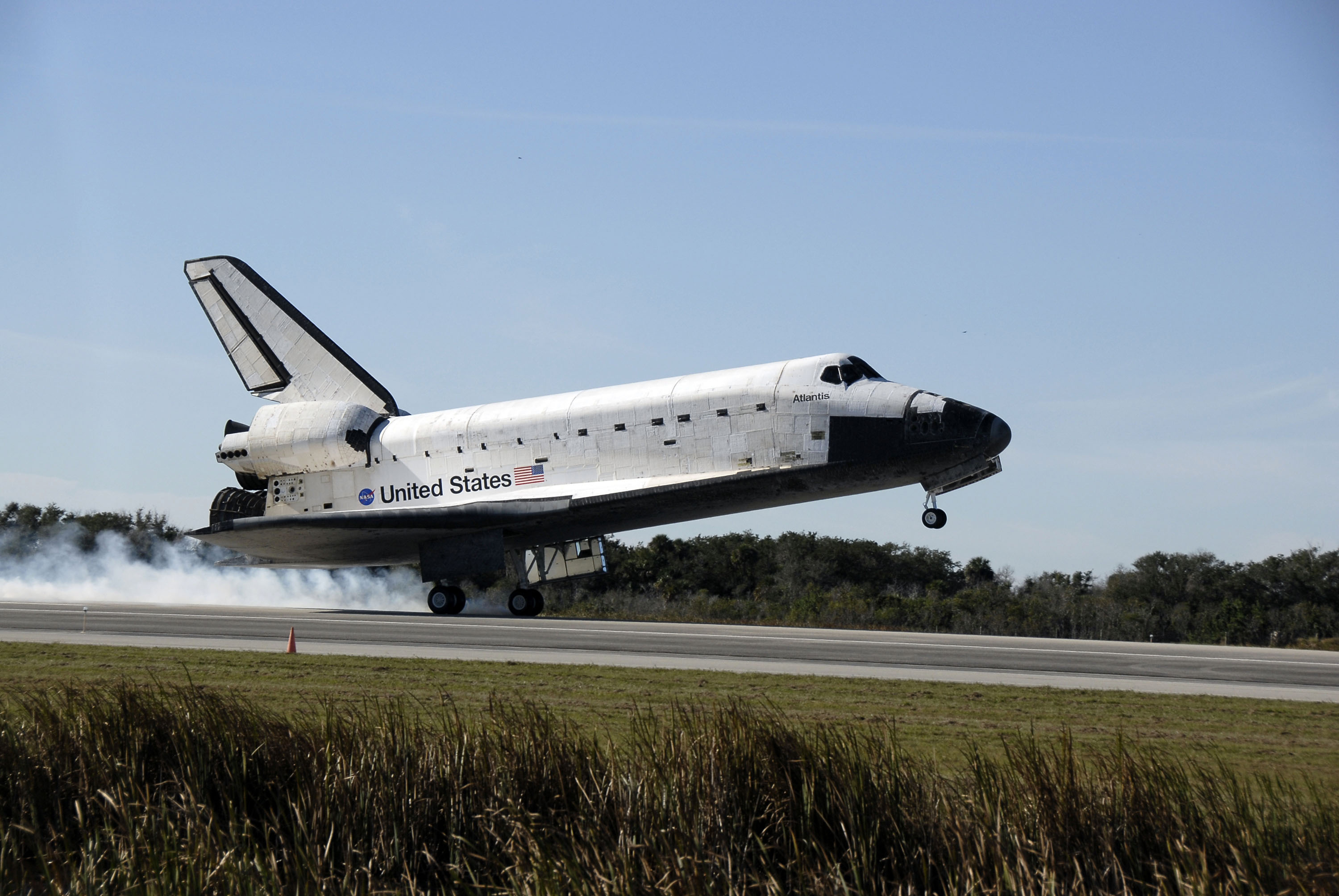
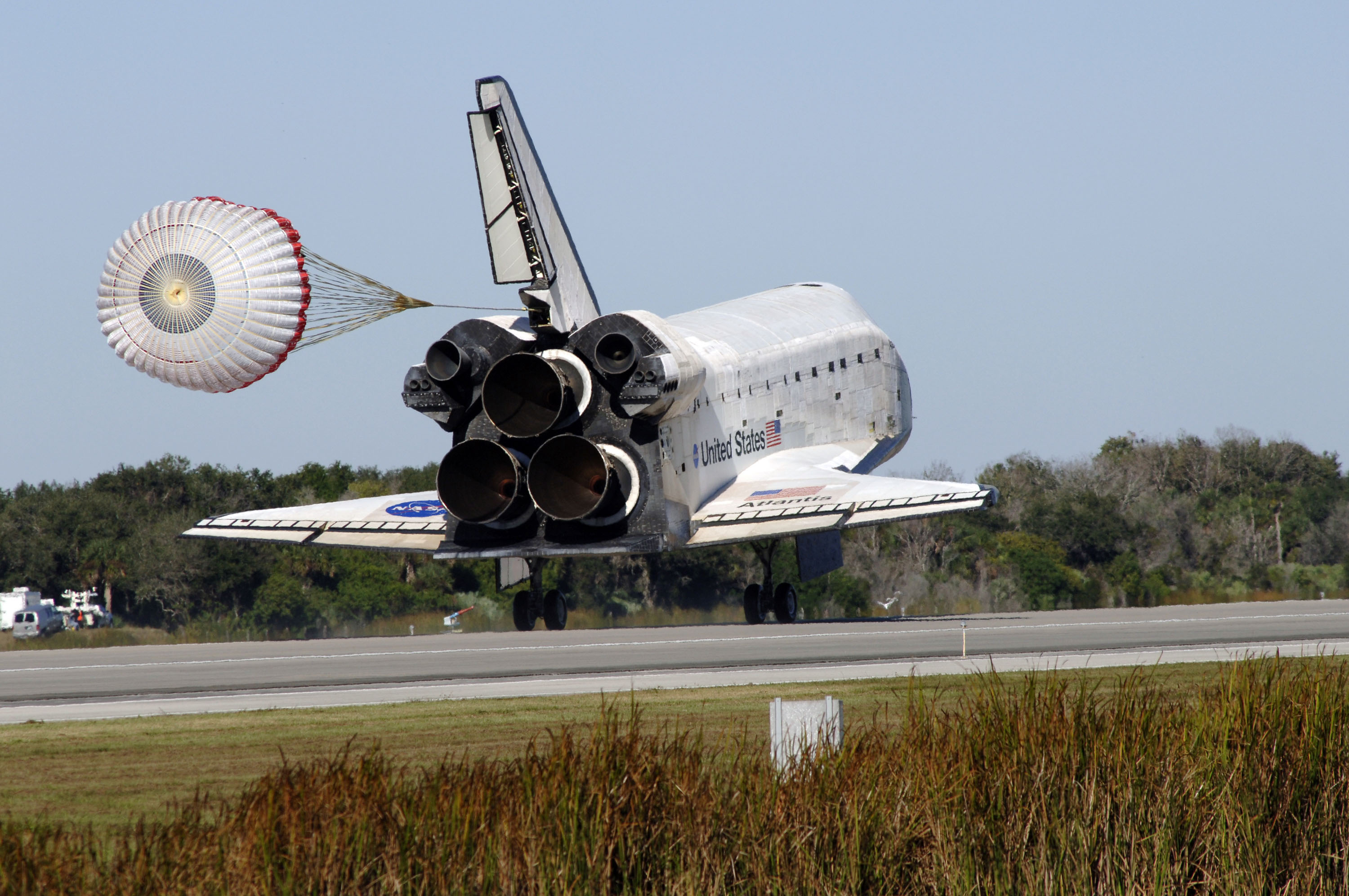
Left: Atlantis about to touch down at NASA’s Kennedy Space Center in Florida. Middle: Atlantis touches down. Right: Atlantis deploys its drag chute as it continues down the runway.
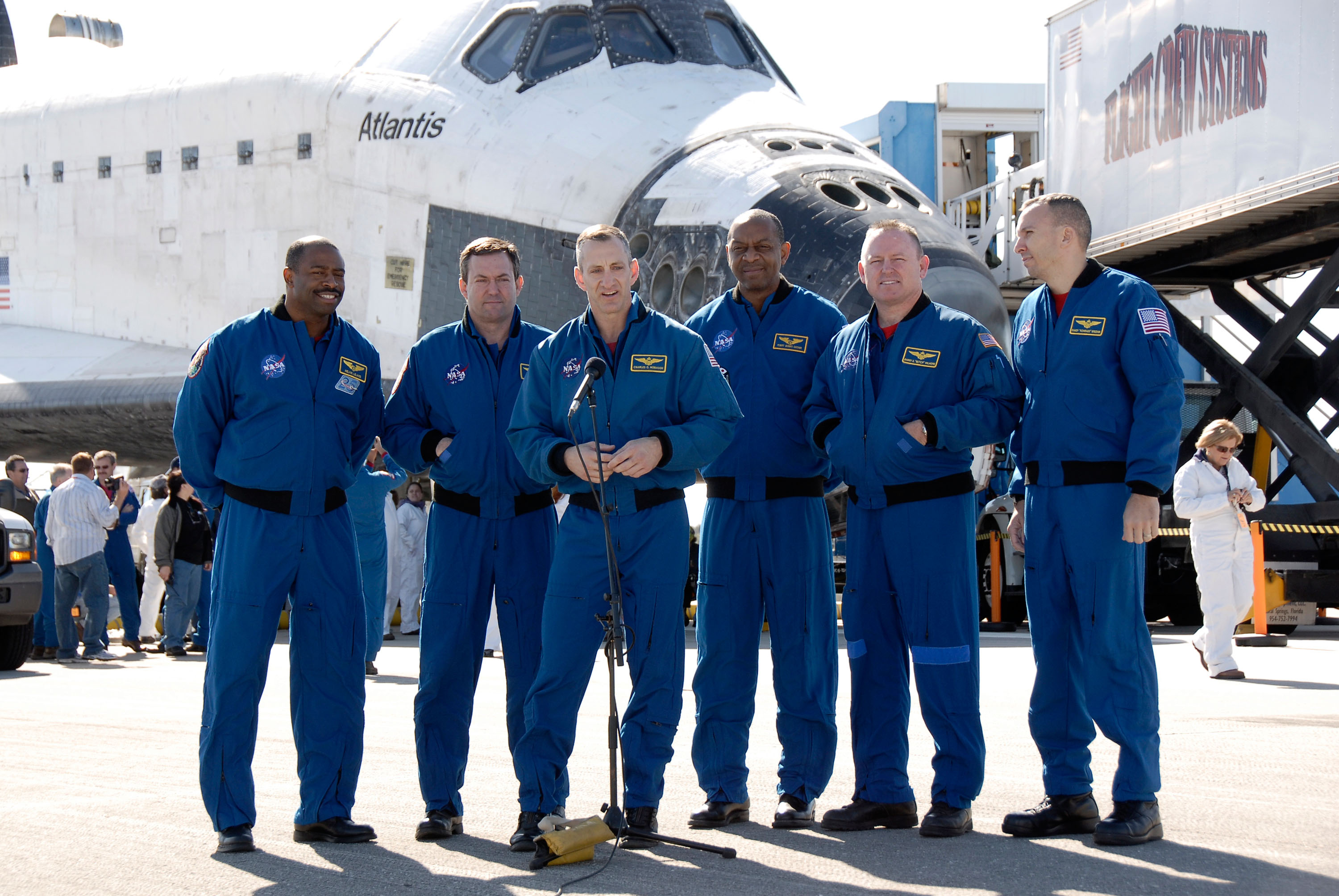
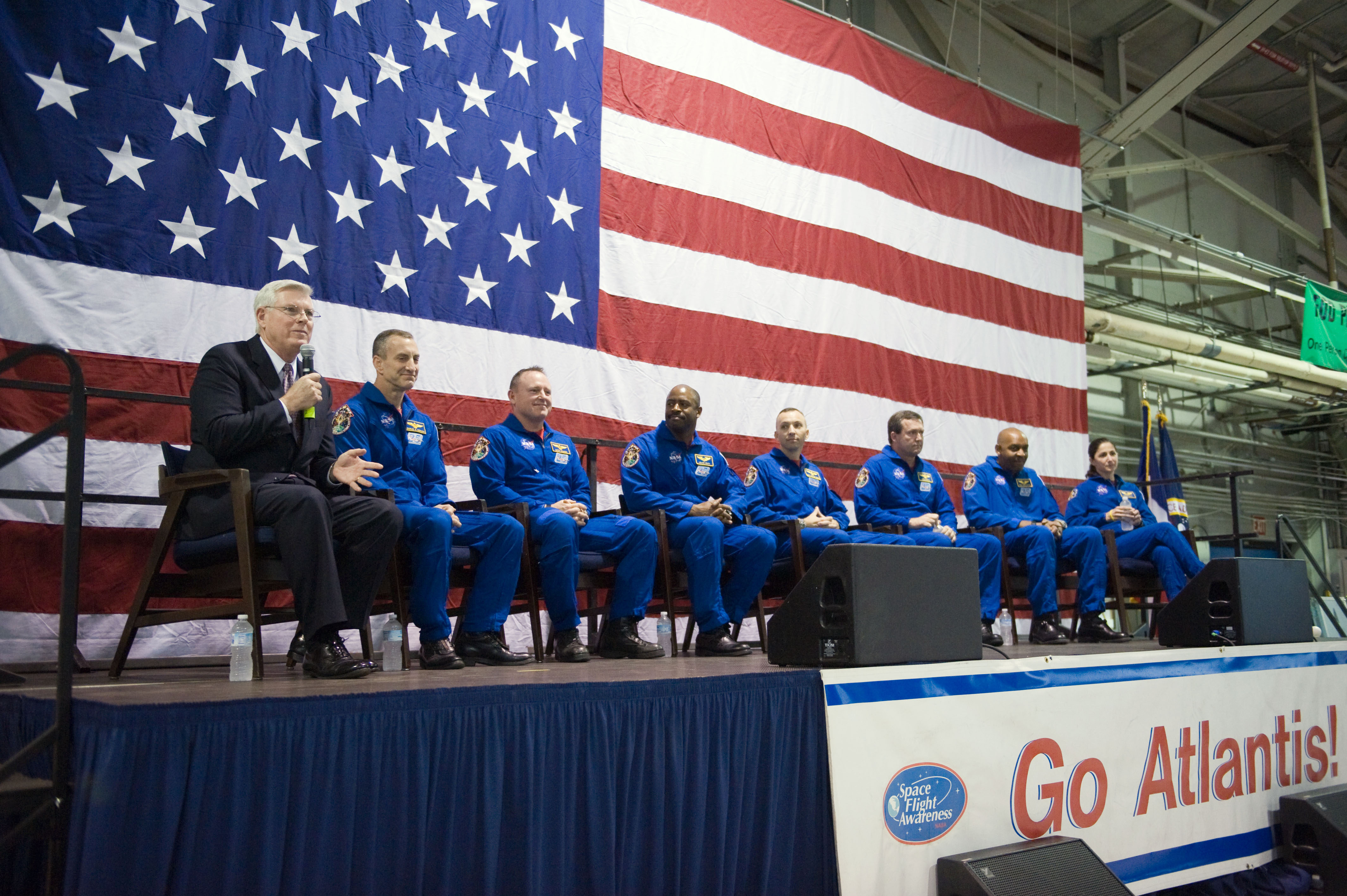
Left: Six of the STS-129 astronauts pose with Atlantis on the runway at NASA’s Kennedy Space Center in Florida. Right: The welcome home ceremony for the STS-129 crew at Ellington Field in Houston.
On Nov. 27, the astronauts closed Atlantis’ payload bay doors, donned their launch and entry suits, and strapped themselves into their seats, a special recumbent one for Stott who had spent the last three months in weightlessness. Hobaugh fired Atlantis’ two Orbital Maneuvering System engines to bring them out of orbit and head for a landing half an orbit later. He guided Atlantis to a smooth touchdown at KSC’s Shuttle Landing Facility.
The landing capped off a very successful STS-129 mission of 10 days, 19 hours, 16 minutes. The six astronauts orbited the planet 171 times. Stott spent 90 days, 10 hours, 45 minutes in space, completing 1,423 orbits of the Earth. After towing Atlantis to the OPF, engineers began preparing it for its next flight, STS-132 in May 2010. The astronauts returned to Houston for a welcoming ceremony at Ellington Field.
Enjoy the crew narrate a video about the STS-129 mission.

.jpg) 1 hour ago
1
1 hour ago
1
 English (US)
English (US)